Smooth seas never made a skilled sailor, and 2022 was anything but smooth. From Google’s automation updates and several tech migrations, there was much to get used to.
Well done on getting through a choppy year, and to the start of a new opportunity.
For us, things haven’t changed in 2023. Not really.
Amidst the uncertainty in the PPC world, you can always count on Optmyzr to do what’s right for you. Our capabilities may evolve with the ad platforms, but fundamentally we’ll always be what PPC marketers need.
In 2022, our product roadmap restored some of the control and visibility you lost when Google made the shift to responsive search ads and Performance Max.
Behind the scenes, our team worked tirelessly on the migration to the new Google Ads API to make sure we didn’t abandon you when you need us most.
So when we say that our customers are priority #1, we mean it. Optmyzr wouldn’t be where we are — celebrating our 10th year in business — without you.
This year, we have a lot of exciting things already in progress: added capabilities for platforms beyond Google, integrations with other marketing tools, new layers of automation, and more.
But first, let’s look at the biggest updates of 2022.
Here’s a quick look at our top products for the year 2022 and a sneak peek into this year’s roadmap.
Top Updates of 2022
Optimization Updates
Stay on top of broken URLs in Google Ads
The URL Checker utility has been upgraded with an improved workflow, making it easier to create and manage settings. You can now pause ads and keywords linking to broken URLs, and re-enable these entities in a future run if the issues are fixed.
Go to URL Checker
Get PMax listing groups data in ‘Top Product & Listing Groups’ widget
We’ve updated the Top Product & Listing Groups Widget for Google Ads to include top listing groups data from your Performance Max campaigns. It makes your Shopping product groups and Performance Max listing groups accessible under one interface.
As a reminder, you could see data earlier for both Standard and Smart Shopping campaigns. Performance Max has taken the place of Smart Shopping.
Go to Reports
Sponsored Brand video data now in Amazon tools
Campaign data for Sponsored Brand videos is now included in dashboards and reports for your Amazon PPC accounts. This removes the inconsistency in data for this campaign type.
Audits and Analysis Updates
Perform root cause analysis for Microsoft Ads
PPC Investigator now has more capabilities to analyze Microsoft Ads accounts.
After picking a metric to investigate, Root Cause Analysis can now highlight specific campaigns, ad groups, product partitions, keywords, and other elements responsible for the change in performance.
Go to PPC Investigator
Cause analysis for Amazon Ads
We’ve added the PPC Investigator cause chart to Amazon Ads insights. You can now conduct in-depth analysis of any performance changes.
Go to dashboard
Get keyword suggestions from Keyword Planner
In the Keyword Lasso tool, you can now select ‘Keyword Planner’ as a source of new keywords using the drop-down menu at the top of the page. Read more about it in our help documentation.
Go to Keyword Lasso
UI improvements to Alerts settings
We’ve released a friendlier interface for our Alerts settings page that includes capabilities such as:
- Create alerts in bulk more easily
- Select all the accounts you want at once
- Support for monthly budget alerts for Amazon and Facebook accounts
- An easier way to create and edit multi-account budget alerts
Go to Alerts
New account dashboard UI for Microsoft Ads
New capabilities include:
- Account Performance Reports: You can choose from our 3 instant report templates, preview them, and schedule them in just a few clicks.
- Data Filters: You can now see data based on Campaign Type or Bid strategy and use one of these new scopes to segment and analyze your data.
Go to Account Dashboard
Evaluate Performance Max campaigns with 8 new audits
We’ve added 8 new audits to help maintain and improve the quality of your Performance Max campaigns. With these, you can easily identify gaps in asset groups and individual assets in terms of their structure and performance.
For example, now you can start using Performance Labels to assess various PMax assets and find asset groups with insufficient headlines, descriptions, images, and more.
Go to PPC Audits
Regularly audit and get quick, actionable insights on MS account health
Use the PPC Policy and Audits tool under the Insights section to identify different problem areas in your Microsoft Ads accounts, as well as to find optimization opportunities for your ads, campaigns, keywords, and more.
Go to PPC Audits
Visualize your Google Ads performance with funnel charts
For Google Ads accounts, the funnel chart feature is accessible in both single and multi-account reports.
Starting with impressions at the top of the funnel, clicks in the middle, and working your way down to conversions, you can easily visualize the performance at different stages of the ad journey.
Go to Reports
New Shopping Feed Audits capabilities
With our new audit feature, you can be proactive rather than reactive when it comes to optimizing shopping ads.
Here’s how you could improve the overall quality of shopping ads and resolve potential issues in the Google Merchant Center feed ahead of time:
- Identify missing values and fields
- Find disapproved products with reasons
- Get suggestions to improve feed quality
The audit examines all of GMC’s parameters, so you can make the necessary adjustments before the problem arises.
Go to insights
Migration and Other Support for RSAs
Free script to turn ETAs into RSAs
Make sure all your ad groups have responsive search ads, even after the July deprecation of expanded text ads.
Our new script builds a bulk sheet with new RSAs for your entire account. It pulls text from existing ads and adds them as assets to suggested new RSAs.
Simply taking existing text from ETAs and adding them to new RSAs in existing ad groups can boost conversions by up to 7% at a similar CPA or ROAS.
Get the script
Optimize your RSA ad copy
Our popular Ad Text Optimization tool now has a version for responsive search ads.
As a hybrid insight and optimization tool, it’ll allow you to both review RSA performance data and modify text components (like headlines and descriptions), individually or in bulk.
Read help documentation
Preview and add Google RSAs and RDAs directly from audits
If you’ve previously run an audit to find out which ad groups have fewer than two responsive search ads, clicking on the ad group name renders a preview of existing ads and their performance.
You’ll also be able to create new responsive search ads, call ads, responsive display ads, or expanded dynamic search ads (depending on campaign type).
Go to PPC Audits
Better your Google Ads performance with 10 new RSA audits
Easily spot gaps and inconsistencies in your RSA assets, and make changes wherever needed. We’ve got 10 new audits to help you identify and resolve potential issues.
Go to PPC Audits
Open AI text suggestions for RSAs
Get new headline and description suggestions for Google and Microsoft responsive search ads.
When selecting this option, you’ll get top suggestions for ad assets from Open AI, allowing for greater variety and more choice when creating your ads.
Go to AB Testing
Express optimization for ad groups without RSAs
There’s now a quicker way to create responsive search ads in Google Ads ad groups that don’t have any.
Our new Optmyzr Express optimization shows you top suggestions for headlines and descriptions, along with top keywords.
Go to Optmyzr Express
Support for budget monitoring
Rule Engine strategies for Budgets
Analyze the performance of your campaign budgets and shared budgets, and tweak the daily budget amount with Rule Engine.
Additionally, the new Budget pacing attribute can help you analyze the pacing of a campaign budget and shared budgets in an account.
Read in detail about RE Budgets
Build Campaigns and keep them in sync with your Shopping Merchant Feed
Optmyzr now supports Performance Max retail campaigns in the following ways:
- Create them in Shopping Campaign Builder 2.0
- Keep them in sync with changes to your Merchant Feed using Shopping Campaign Refresher 2.0
Retail advertisers will find it easier to build Performance Max campaigns at scale, and automate sync with products entering and leaving a feed in near real time.
Go to the Campaign Builder
Go to the Campaign Refresher
New in Campaign Automator
These updates require a Campaign Automator subscription to view. Go to the tool or contact support@optmyzr.com if you’d like to discuss getting access.
Organize ads with templates
Creating labels for different ads is now easier when you use Campaign Automator templates. Get added flexibility to manage and optimize all your ads.
Take bulk actions or customize your approach. For instance, run select ad labels on certain days, or get reports only for a particular set of labels.
Create new ads in paused state
You can now create new ads in a paused state and turn them on later via our Rule Engine or in Google Ads.
Please note that you can only create new ads in a paused state for the first template run. They will be automatically enabled in subsequent runs.
Expand your target group with broader URL targeting
Add broader targets for Dynamic Search Ad Groups using rules in PPC Policy and Audits.
For example, target URLs that contain the keyword “Optmyzr” instead of exact URLs. This lets you reach a broader audience, leading to more traffic.
You still have the option to use exact URLs for targeting anytime.
Learn With Optmyzr: The New Reports Experience
Our latest Learn With Optmyzr video shows you how quick and easy it is to create them with our new report designer.
Build report templates for single accounts, and set them up across your Google Ads and Microsoft Ads accounts without creating a new template for each account.
Or create comprehensive reports for clients who advertise across multiple platforms, including Google, Microsoft, Amazon, Meta/Facebook, and Google Analytics.
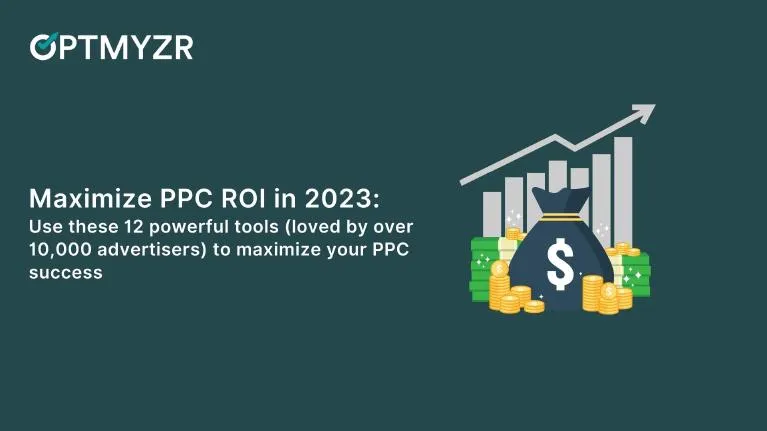
With an eventful year coming to a close, our customer and analytics teams identified the most used and talked about features of 2022.
Here are the 12 Optmyzr tools that our 10,000+ users made integral to their PPC management and optimization workflows.
We’re thrilled you loved and used so many of our new capabilities in 2022, and we’re ready to step it up in 2023. There will be many new updates and features, but the goal is still the same: to help you better manage your PPC accounts.
What to Expect in 2023
- New features and capabilities to better manage ad platform automation such as Performance Max, Smart Bidding, and RSAs
- Better integrate your business data easily, both to enhance ad platform decision-making and to run experiments
- Support for the transition to Google Analytics 4 and changes in audience targeting
- New Rule Engine strategies, audits, alert types, scripts and script support, and more automation layering
Continuing its prominent role from this year, PPC automation is predicted to be a major industry trend in 2023. With the uncertainty of upcoming quarters, you’ll want to stay up-to-date with PPC automation to mitigate any negative market effects.
We got an early start on next year’s work to meet your needs in an evolving market.
The past month’s updates include quick audits to manage, optimize, and control the quality of your RSA campaigns; one-click optimizations with prebuilt Rule Engine strategies; and much more.
Here’s everything we updated in November 2022.
Audits and Insights
Evaluate Performance Max campaigns with 8 new audits
We’ve added 8 new audits to help maintain and improve the quality of your Performance Max campaigns. With these, you can quickly identify gaps in asset groups and individual assets in structure and performance.
For example, you can now use Performance Labels to assess various PMax assets and find asset groups with insufficient headlines, descriptions, images, and more.
Go to PPC Policy and Audits
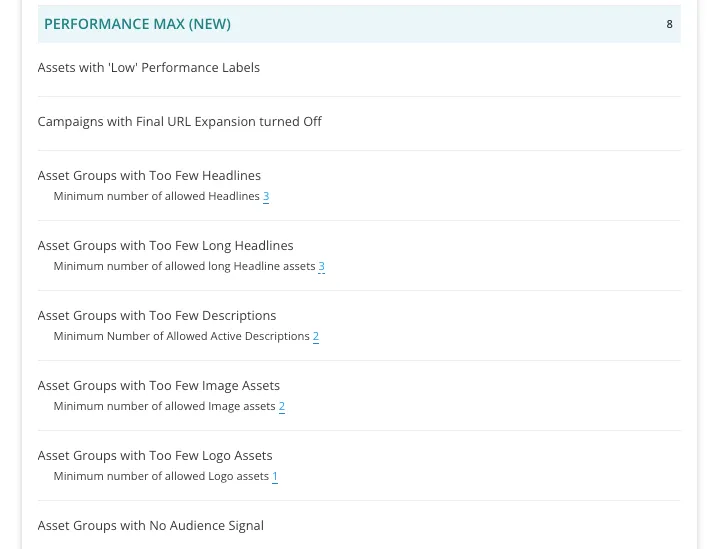
Give more direction to your Amazon campaigns
PPC Policy and Audits are available for Amazon Ads (under Insights) to provide a more in-depth evaluation at various levels of your account.
Each audit has an individual grade; hover over the result, and more specific information will be displayed. This allows you to make periodic adjustments to achieve better results.
Go to PPC Audits
Better your Google Ads performance with 10 new RSA audits
We’ve got 10 new audits to help identify and resolve potential issues with your Google RSAs.
You can easily spot gaps and inconsistencies in your RSA assets and make changes wherever needed.
For example, the headline and description assets are too few and short, or there are some duplicate and underperforming assets. You can quickly make these changes to boost Google’s ability to create unique ad combinations.
Go to PPC Policy and Audits
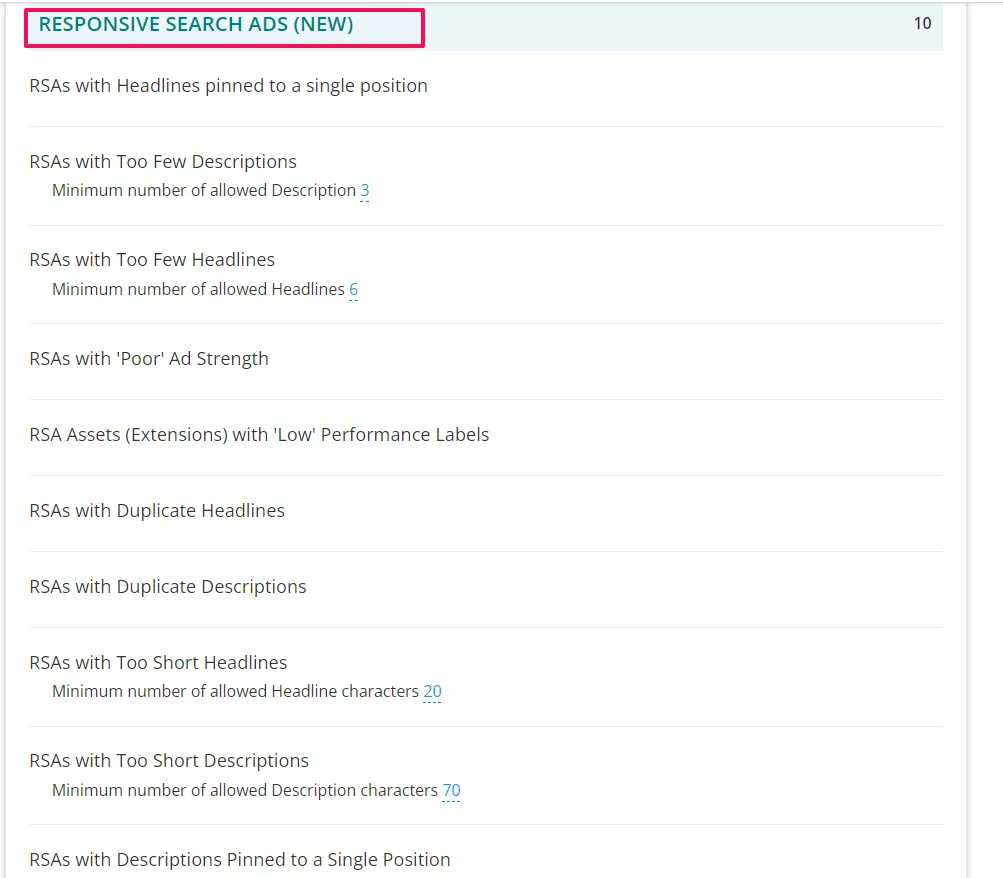
Visualize your Google Ads performance with funnel charts
For Google Ads accounts, the funnel chart feature is accessible in both single and multi-account reports.
Starting with impressions at the top of the funnel, clicks in the middle, and working your way down to conversions, you can easily visualize the performance at different stages of the ad journey.
Go to reports.
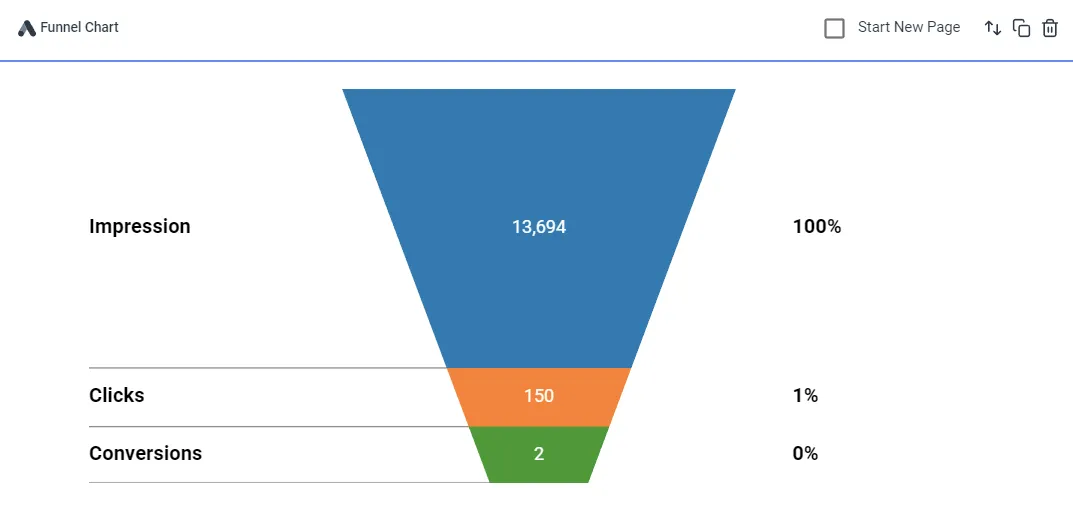
Take advantage of new audit capabilities to better plan your holiday shopping promotions
With our new audit feature, you can be proactive rather than reactive when it comes to optimizing shopping ads.
Here’s how you could improve the overall quality of shopping ads and resolve potential issues in the Google Merchant Center feed ahead of time:
- Identify missing values and fields
- Find disapproved products with reasons
- Get suggestions to improve feed quality
The audit examines all of GMC’s parameters, so you can make the necessary adjustments before the problem arises.
Go to insights
Rule Engine
Create keyword labels and other Rule Engine Strategies
We have a new update that helps you manage and analyze keywords better.
Here’s what you can do with our Keyword Label feature:
- Create custom labels for your keywords
- Quickly generate reports on your keyword data
- Use labels in other Rule Engine strategies for further analysis
You can also selectively remove labels using basic operators such as equal to, contains, and so on.
Go to Rule Engine
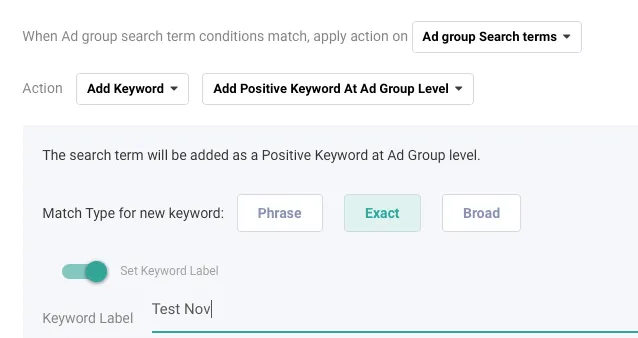
Manage Amazon accounts faster with Rule Engine Strategies
We’ve released several new prebuilt strategies for Amazon Ads. Browse and deploy any strategy with a few clicks:
- Add non-converting search terms as negative keywords
- Add new keywords
- Modify bids based on ACOS
- View keywords and campaign performance reports
Go to Rule Engine
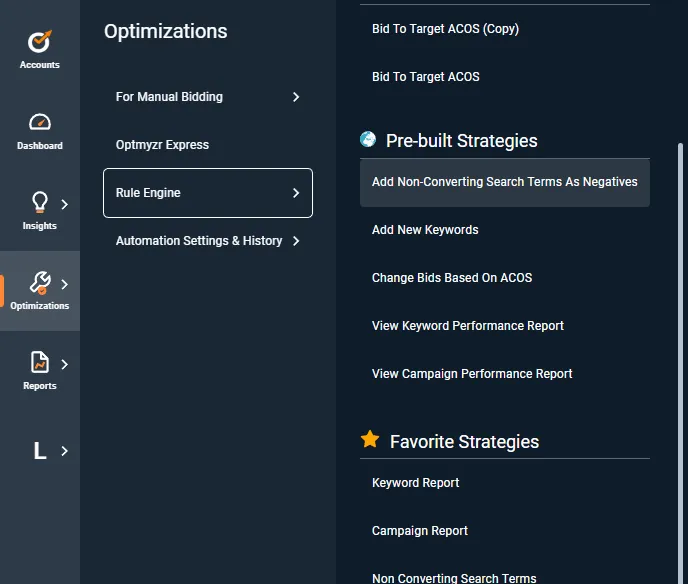
Google and Microsoft Responsive Search Ads
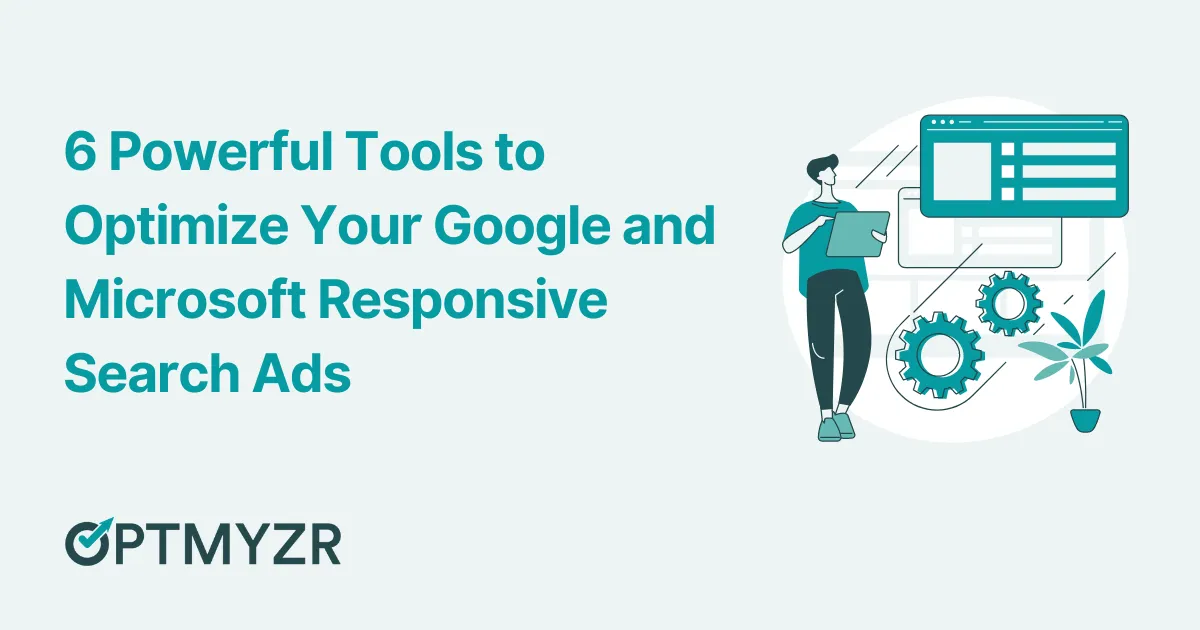
To help maintain control of your pay-per-click (PPC) campaigns, including your Google and Microsoft Responsive Search Ads (RSAs), we at Optmyzr recently developed several powerful tools and features.
Here’s a blog post that summarizes all of them, with some useful links to jump right to the updates and tools.
Despite an unsteady economy, Amazon is still the most popular online retailer in the United States. Even though people are cutting back on spending because of the recession, Amazon still attracts sellers and is preparing for another busy year.
So, whether you’re looking to refine a current strategy or start from scratch, we have the tools to help you manage your Amazon Ads effectively.
It feels like we’ve turned a corner on PPC automation.
Our customer success and sales teams now have more conversations about how to build and use automation, or how to make Google’s automation make better decisions for the accounts people manage.
Strong resistance from just a few months ago has given way to acceptance that we do indeed play in Google’s garden and, more importantly, confidence that there are still ways to get great PPC results.
Our own evolution at Optmyzr is similarly encouraging. We’re increasing our support for platforms outside Google, starting with Microsoft and Meta. This month, you’ll also see multiple updates aimed at helping ecommerce advertisers contend with the demands of the holiday season.
Here’s everything we updated in October 2022.
Responsive Search Ads
Create responsive display ads from the Audits tool
Actionable audits now let you create Responsive Display Ads without going to another tool. This is only compatible with Google Ads accounts.
Go to Audits
Open AI text suggestions for RSAs
Get new headline and description suggestions for Google and Microsoft responsive search ads.
When selecting this option, you’ll get top suggestions for ad assets from Open AI, allowing for greater variety and more choice when constructing ads.
Go to A/B Testing for Ads
Check your ads for typos
The new spell check feature reviews the headlines and descriptions of your responsive search ads to find and fix common typos and other mistakes.
Add custom words to an account’s dictionary, and set the language to your preference for each account.
Go to Ad Text Optimization for RSAs
More control over RSA pinning
You now have the option to pin and unpin headlines and descriptions while editing via the Ad Text Optimization tool for responsive search ads.
Works with both Google Ads and Microsoft Ads accounts.
Go to the RSA optimization tool
Rule Engine
Select final URL as a Rule Engine attribute
When building or modifying Rule Engine strategies for Google Ads, the “final URL” attribute can now be selected from the ads scope.
Use this to get a report based on the final URLs of your ads, or edit final URLs in bulk using the “find and replace” action.
Go to Rule Engine
Track conversions when they happen
For Google Ads, ‘Conversion By Time’ metrics have been added to the following scopes:
- Account/Customer
- Campaign
- Ad group
- Ad
- Keywords
- Ad group audience
These metrics make sure that conversions are attributed to the date on which it happened, rather than when the ad was clicked. Learn more about these metrics from Google.
Go to Rule Engine
Audits
Change audit templates on main dashboard
You now have the option to choose which audit template you want to determine Google Ads audit scores.
From the account dashboard, move your cursor to the PPC Audit Score card on the right to reveal a gear icon. Click it to change your audit template for a single account or all the accounts you manage.
Go to your dashboard
Include ad labels when creating ads via audits
While creating new ads via actionable audits, you can mention an ad label in a new field.
This is compatible only with Google Ads.
Go to Audits
Reporting & Workflows
Two new widgets for Google Ads reporting
We’ve added two new widgets with Google Ads support to our new report designer:
- A funnel widget to visualize performance data by filtering out clicks and conversions in stages
- A spend projection widget to help you report on whether or not you can achieve a target budget, or track budget pacing status
Go to the Reporting hub
Timestamps for PPC task lists
We’ve added a timestamp next to all completed tasks on the “My Tasks” page of the Account Blueprints feature.
Go to My Tasks
It’s remarkable how quickly we’ve all had to adjust to the new realities of advertising with Google and other ad platforms.
You can’t have a conversation about PPC these days without automation coming up. We hear about it every time we record a PPC Town Hall, in every call and chat with customers, and all over social media. Performance Max, Responsive Search Ads, and Smart Bidding with Target ROAS tend to come up most frequently.
Everyone at Optmyzr is working as hard as we can to make sure you’re able to use our tools to run great campaigns that meet the demands of modern PPC.
We’ve got some exciting updates for you this month, including support for Performance Max in two of our most popular shopping tools and an announcement on how we support Google’s new scripts experience.
Here’s everything we updated in September 2022.
Support for Performance Max retail campaigns
Optmyzr now supports Performance Max retail campaigns in the following ways:
Retail advertisers will find it easier to build Performance Max campaigns at scale, and automate sync with products entering and leaving a feed in near real time.
For campaign groups created using Optmyzr, we categorize the results in three ways:
- Fully Upgraded: All campaigns in the campaign group were upgraded to Performance Max. We bring the new PMax campaigns back into the campaign group and refresh them as a PMax campaign group.
- Partially Upgraded: If only some campaigns were upgraded and others are still Smart Shopping, we only refresh the Smart Shopping campaigns and do not give suggestions for new campaigns. You can refresh PMax campaigns using the “refresh existing campaign” option but will not be able to automate these.
- Not Upgraded: A normal Smart Shopping campaign group.
For existing campaigns created outside Optmyzr:
- If there is no automation, we will pick up the PMax campaign and allow refreshing and setting up automation.
- If there’s any automation running for existing Smart Shopping campaigns and these are upgraded to PMax, we’ll map the old Smart Shopping campaign to the new PMax campaign and refresh this new one.
Responsive Search Ads
Filter by label in RSA Optimization tool
Ad labels have been added as a filter option in the Ad Text Optimization tool for responsive search ads. This helps limit the data you see to ads with a specific label.
Works with both Google Ads and Microsoft Ads accounts.
Preview and add Google RSAs directly from audits
If you’ve previously run an audit to find out which ad groups have fewer than two responsive search ads, clicking on the ad group name renders a preview of existing ads and their performance.
You’ll also be able to create new responsive search ads, call ads, or expanded dynamic search ads (depending on campaign type).
More control over edited RSA headlines
When editing a headline or description for a Responsive Search Ad in Optmyzr (Google or Microsoft Ads), you now have the option to create it as a new asset in the existing ad.
For example, you can turn the headline “Product X is available in three vibrant new colors” into a new one (such as “Product X now in red, blue, and orange”), adding it to any existing RSAs with at least one more open headline slot.
Both headlines will exist in your selected ads, and you can opt to remove either asset at a later time.
Google Ads
See search terms from Google Search Partners
The attribute “network type” is now available in the campaign scope of the Rule Engine. This makes it easier to view search terms coming from the Search Partners network.
Exclude search terms from DSA ad groups
The attribute “ad group type” is now available in the ad group scope of the Rule Engine. This makes it easier to exclude search terms from Dynamic Search Ad ad groups.
Easily add UA conversions to GA4
If you use Google’s automatic migration tool to upgrade from Universal Analytics (UA) to Google Analytics 4 (GA4), you’ll notice that it doesn’t migrate your goals in the process.
This makes the data in GA4 much less helpful in optimizing your ads.
Stay on top of broken URLs in Google Ads
The URL Checker utility has been upgraded with an improved workflow, making it easier to create and manage settings. You can now pause ads and keywords linking to broken URLs, and re-enable these entities in a future run if the issues are fixed.
This tool is only available for customers on current subscriptions. If you’re on a legacy plan, write to your account manager to discuss a solution.
Announcement on support for Google Ads scripts
Optmyzr now supports these seven Enhanced Scripts:
- Flexible Budgets
- Reach Target Monthly Spend
- Check Destination URLs
- Check Sitelinks URLs
- Anomaly Detector
- Hourly Campaign Level Dayparts
- Report Hourly Stats
All of these have been updated to work with both new and old experiences.
If you were an Optmyzr customer before June 14, 2022, you will see a ‘Deprecated’ tag next to older scripts that we no longer support.
Get suggestions for Target ROAS/CPA adjustments
Get a new suggested Target ROAS value for campaigns running on the Maximize Conversion Value bidding strategy. You can then perform any of the following actions:
- Apply suggested changes directly
- View the strategy and add it to your list of Rule Engine strategies where you can
- Edit it further
- Automate it to run on a schedule
Compatible with Performance Max campaigns
Go to Optimize Target ROAS
Go to Optimize Target CPA
Microsoft Ads
Parity for Microsoft Ads in RSA Utility
Our Responsive Search Ads Utility is now a practical solution for creating new RSAs in your Microsoft Ads accounts.
Get suggestions for headlines and descriptions, modify or delete as needed, create new ads easily, and take them live with a single click.
Prep your Microsoft Ads accounts for ETA sunset
A new utility tool allows you to make sure all your Microsoft Ads ad groups contain Responsive Search Ads by converting Expanded Text Ads in bulk.
- Download a CSV of your existing ETAs
- Edit them, making necessary changes to their headlines and descriptions.
- Upload the edited CSV via Optmyzr of the Microsoft Ads interface.
New widgets for more relevant PPC audits in Microsoft
More widgets have been added for Microsoft Ads to help you better audit ads, ad groups, performance, and other levels e.g. “ad groups with too few Responsive Search Ads”.
Rule Engine
Automate which search terms become negative keywords
You can now add search terms to a negative keywords list via an action in the search terms scope of the Rule Engine. This list can be created and edited with rules.
Ad platforms have been busy rolling out automation updates over the past couple of months. That’s kept the pressure on us to make sure our software is up-to-date with the latest advancements in PPC land.
August at Optmyzr HQ was all about translating those updates into features and capabilities. We’re happy to share that our team has more than delivered.
For example, with Responsive Search Ads becoming the default in Google and gaining priority in Microsoft, it was important for us to support them in our testing and optimization tools.
Here’s everything we updated in July and August 2022.
New for Responsive Search Ads
More control over edited RSA headlines
When editing a headline or description for a Responsive Search Ad in Optmyzr (Google or Microsoft Ads), you now have the option to create it as a new asset in the existing ad.
For example, you can turn the headline “Product X is available in three vibrant new colors” into a new one (such as “Product X now in red, blue, and orange”), adding it to any existing RSAs with at least one more open headline slot.
Both headlines will exist in your selected ads, and you can opt to remove either asset at a later time.
Responsive Search Ads can be selected in our testing tool
Our A/B Testing for Ads tool lets you make sure only the best ad copy is active. You can now select Responsive Search Ads in Microsoft to analyze, test, modify, and pause.
Optimize the copy of your Responsive Search Ads
The Ad Text Optimization for Responsive Search Ads is an optimization and insight tool that breaks down and reviews your ad performance data by its components. It also allows you to make changes in bulk to different ad components.
This tools is now available for use with Microsoft Ads accounts.
Express optimization for ad groups without RSAs
There’s now a quicker way to create Responsive Search Ads in Google Ads ad groups that don’t have any.
Our new Optmyzr Express optimization shows you top suggestions for headlines and descriptions, along with top keywords.
New for Microsoft Ads
Regularly get quick, actionable insights on MS account health
Use the PPC Policy and Audits tool under the insights section to identify different problem areas in your Microsoft Ads accounts, as well as to find optimization opportunities for your ads, campaigns, keywords and more.
Perform root cause analysis for Microsoft Ads
PPC Investigator now has more capabilities to analyze Microsoft Ads accounts.
After picking a metric to investigate, Root Cause Analysis can now highlight specific campaigns, ad groups, product partitions, keywords, and other elements responsible for the change in performance.
New for Facebook Ads
Performance Analysis for Facebook
We’ve added a new insight tool for Facebook Ads campaigns.
You can now compare the performance between campaigns, or for the same campaign with different date ranges.
New for Amazon Ads
Root cause analysis for Amazon Ads
We’ve added the PPC Investigator cause chart to Amazon Ads insights. You can now conduct in-depth analysis of any performance changes.
New bulk actions for negative keyword suggestions
The ‘Find Negative Keywords’ tool now has a faster way to review suggestions. You can now archive or change match types in bulk for both Google and Microsoft Ads.
Two new express optimizations for extensions
Optmyzr Express now includes the following optimization options:
- Add callout extensions to campaigns
- Add call extensions to campaigns
Call detail metrics added to Rule Engine
You can now use metrics like phone calls, phone impressions, and phone-through rate to analyze or modify ad groups and campaigns in Google Ads.
Additional insights in PPC Audits report
Some audit results will show a link to more details (as seen in this screenshot below for Extensions). This is available for campaigns (campaign settings, ad groups, extensions) and ad groups (ad group settings, keywords, ads).
Clicking the link will open a sidebar with more information related to that entry.
New in reporting
Introducing the new report designer
Configure widgets with ease, preview while editing settings, and add account/campaign selectors from within the widget settings.
Schedule quarterly reports
Report scheduling now includes the option to select specific months of the year.
Schedule reports for delivery in Slack
Select this option in the schedule window to deliver reports to mentioned recipients via Slack.
Note: This requires your Optmyzr and Slack accounts to be connected.
Include campaign names in reports
Just like accounts, dynamic insertion of campaign names is now supported using {CS1} where the number reflects the chosen campaign selector.
Additional metrics in Google Ads reporting
The following metrics have been added to the KPI, Summary, Top Campaigns and Performance Comparison widgets in our report builder:
- Unadjusted conversion value
- Conversion value adjustment
If you adjust Conversion Value Rules to optimize the conversion value of your budget, these metrics allow you to see the base conversion value as well as the adjustment made to it.
New for Campaign Automator
Campaign Automator: final URL at the keywords level
You can now add final URLs for keywords using Campaign Automator templates. This lets you customize landing page URLs related to each keyword.
Please note, access to this tool requires a Campaign Automator subscription.
While WordStream was announcing they would deprecate the software part of their business, our product and engineering teams were migrating Optmyzr fully to the new Google Ads API.
We’re delighted to announce that not only is that migration effectively complete, but we’ve also managed to release several new capabilities during the same period. Here’s everything we updated from April–June 2022.
Optimize the ROI of your ad spend
Google’s ‘Maximize Conversion Value’ bid strategy with a target ROAS has two major advantages: it recognizes that not all conversions are equally valuable, and it allows you to use that to get the best possible return on investment.
As with any ad platform automation, this strategy is only as good as the data it runs on. So you’ll want to use our recent capabilities to structure that business data in a way that Smart Bidding can understand.
Once Google knows what drives results for your business, you can reap benefits such as:
• Higher quality conversions for the same budget
• Less junk and more leads that turn into paying customers
• More sales to profitable customers and fewer returned orders
Create training data for Google’s Smart Bidding algorithms
Go to Segment Scorer
Optimizing for ROI or conversion value takes your ad budget as far as it can go. The first step is identifying segments (like location, audience, or device type) that tend to correlate with higher quality conversions.
We’ll show you a list of segments and ask you to score them from 1–5, with 1 meaning you want to see fewer conversions like that and 5 meaning you want to see many more.
Remember: Don’t base your scores on Google data (like CTR and bounce rate). Instead, work with business teams to identify the correlation between segments and insights such as:
- Average order value
- Lifetime value
- Lead-to-sale conversion rate
Or any other model that matters to your profitability.
Because the people with access to this knowledge aren’t always on PPC teams, we’ve created a spreadsheet template you can give them. Once they rate different audience segments in bulk, just feed it back into the Segment Scorer.
Turn business insights into bid modifiers for Smart Bidding
Go to Optimize Value Rules
Once you’ve scored enough segments, we’ll turn those ratings into a format Google Ads can understand: Conversion Value Rules. These values tell Smart Bidding how much higher or lower to adjust its CPC bid for that particular segment e.g. United States, repeat customers, mobile.
After you apply recommended changes to Google, Target ROAS and Maximize Conversion Value bid strategies will automatically start working to get you more of the conversions you value the most.
When it comes to applying Value Rules or any ROI optimization strategy, you can create several safeguards to both prevent unwanted behavior and maximize effectiveness. We’ve put together two guides to help you manage these processes.
Read: Optimizing a value-based strategy
Read: All about Conversion Value Rules
Performance Max is the biggest thing in Google Ads at the moment. A major shift in automation balance, it will absorb Smart Shopping campaigns in the next few months. Here’s where our product currently supports Performance Max data.
Shopping Analysis: This update provides an easy way to analyze product-level performance data for Performance Max campaigns (with Merchant Feed). There is no change from how you use this tool for Smart or standard shopping.
Spend Projection: Performance Max campaigns are now visible in the Spend Projection tool, allowing you to gauge how those campaigns will pace/exhaust an assigned budget.
Optimize Budgets: You can now meet spend targets and maximize return on investment for Performance Max campaigns, and reallocate budgets based on performance. Also available for multi-account budgets.
An easier transition to Responsive Search Ads
With Expanded Text Ads now not so expansive after their sunset on June 30, our support for search ad optimization will focus solely on Responsive Search Ads. Here are our updates for managing RSAs from the last three months.
Optimize your RSA ad copy
Our popular Ad Text Optimization tool now has a version for Responsive Search Ads.
As a hybrid insight and optimization tool, it’ll allow you to both review RSA performance data and modify text components (like headlines and descriptions), individually or in bulk.
Read help documentation
Go to optimization tool
Free script to turn ETAs into RSAs
Make sure all your ad groups have Responsive Search Ads before Google disables Expanded Text Ad use in July.
Our new script builds a bulk sheet with new RSAs for your entire account. It pulls text from existing ads and adds them as assets to suggested new RSAs.
Simply taking existing text from ETAs and adding them to new RSAs in existing ad groups can boost conversions by up to 7% at a similar CPA or ROAS.
Get the script
Turn ETAs into RSAs with Campaign Automator
Campaign Automator now supports bulk creation of Responsive Search Ads using existing Expanded Text Ads.
With ETAs no longer available for creation or editing as of today, this could benefit you if your campaigns still haven’t migrated to RSAs.
Watch the video below for more details and remember — you can still pause and enable existing ETAs both manually and via Campaign Automator:
Building a better Optmyzr experience
Everything we do begins and ends with making sure our customers aren’t just satisfied using Optmyzr, but happy to recommend it to other PPC marketers. These next updates were centered around improving that experience.
UI improvements to alert settings
We’ve released a friendlier interface for our Alert Settings page that includes capabilities such as:
- Create alerts in bulk more easily
- Select all the accounts you want at once
- Support for monthly budget alerts for Amazon and Facebook accounts
- Easier way to create and edit multi-account budget alerts
Go to alert settings
Leave more detailed feedback in the app
In new tools and features, you’ll now see a blue feedback tab. Click on this to leave real-time feedback in the app using three methods:
- Click anywhere to write a text comment
- Draw using your mouse or via touch
- Record a brief video
This way, you no longer have to type out an email and can show us exactly what we can improve or what you’d like to see change.
Test it out
See campaign placement data on the account dashboard
The Campaign Placements table on the Account Dashboard shows and sorts performance data for all your campaign placements. With this, you can easily see which placements are working for any given campaign type.
Go to dashboard
Added support for Amazon Ads
People know us as Google Ads experts, but we’re keen to support advertisers and agencies managing other platforms as well. These updates for our support of Amazon Ads campaigns are a step in that direction.
Cut wasteful spend on Amazon Ads
We now provide suggestions for non-converting and costly product targets in Amazon Advertising campaigns. This is intended to help you reduce wasted spend and focus on better-performing targets.
Go to Amazon express optimizations
Campaign data for Sponsored Brand Videos is now included in dashboards and reports for your Amazon PPC accounts. This removes the inconsistency in data we had earlier for this campaign type.
Rule Engine strategies for Budgets
Analyze the performance of your campaign budgets and shared budgets, and tweak the daily budget amount with Rule Engine
Additionally, the new Budget pacing attribute can help you analyze the pacing of a campaign budget and shared budgets in an account.

Read in detail about Rule Engine Budgets.
Monthly budget targets for FB & Amazon now on the Dashboard
Specify your monthly budget targets for Facebook & Amazon on the MCC Dashboard to get insights on how you’ve spent the budget and how it is pacing.
The Budget Pacing column indicates what percentage you’ve spent relative to what you should have spent as a share of the month (linear spending).

Click on the ‘bulk edit account details’ option to start entering your budgets for Facebook and Amazon ads accounts.
New UI with added functionalities for Automation Schedules
Quickly find what you’re looking for using the ‘Search’ bar and other filters like Account, Platform, Users, and more.
Bulk edit option modify frequency, recipients or pause/enable and even delete for multiple automation schedules at a time.
Shortcuts to access the relevant settings directly in the respective tools.
Use the right-side tray to edit or review the details associated with each schedule.
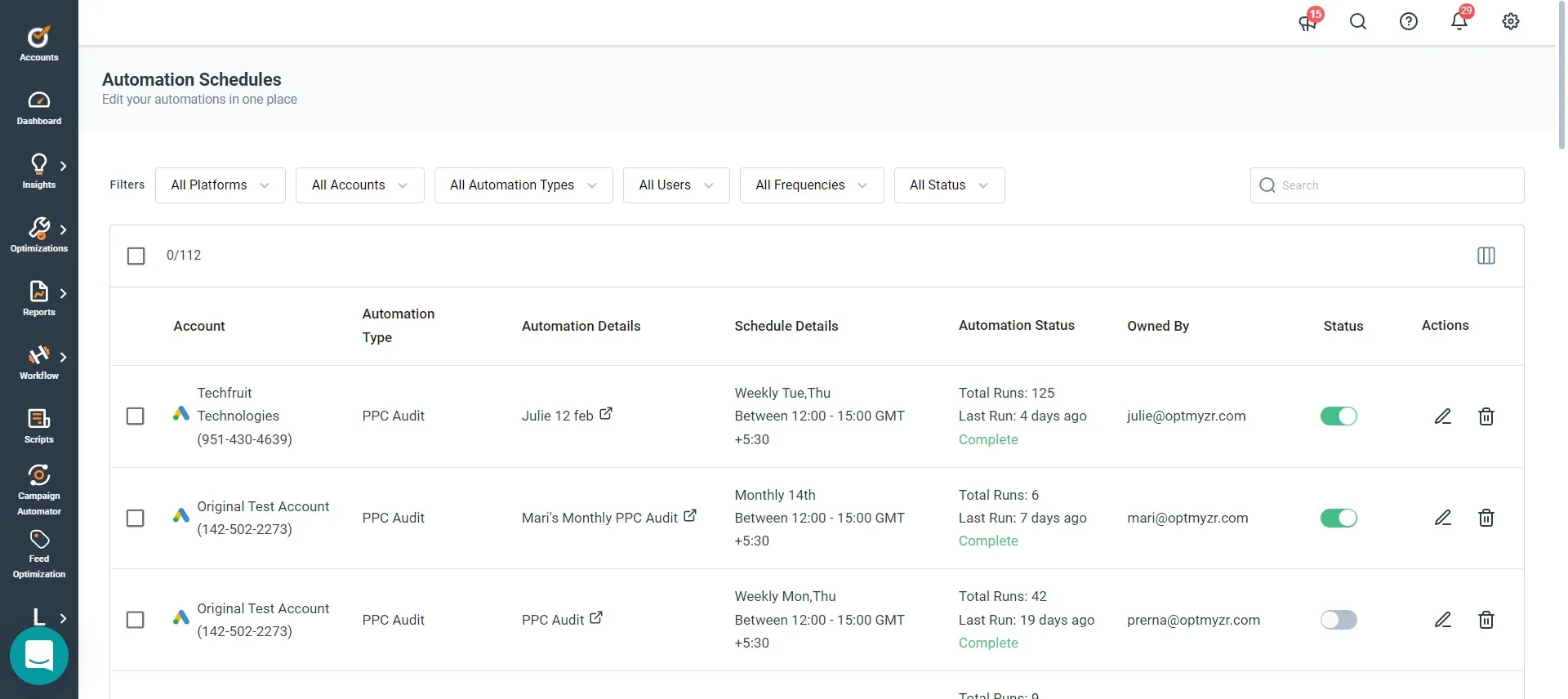
Setting up Conversion Value Rules helps in optimizing an account’s performance by teaching Google’s automations (like those that handle Smart Bidding to optimize Target ROAS, Maximize conversion value, and Smart Shopping campaigns) more about your business.
The ‘Optimize Value Rules’ tool suggests conversion value rules that you can set up in your Google Ads account. These suggestions are based on data from the segments you score in Segment Scorer.
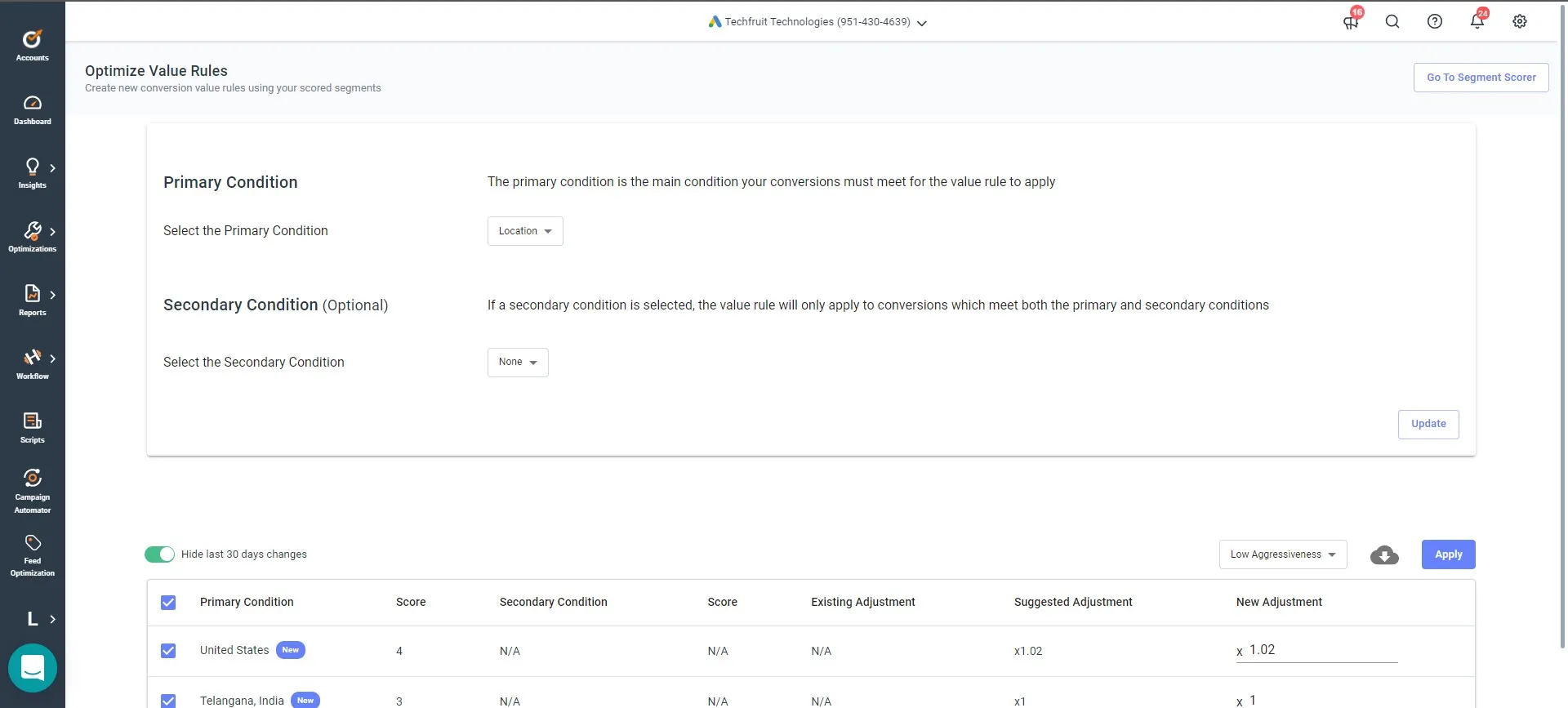
You can also see what’s in store for the coming months and suggest feature requests on the Optmyzr Roadmap.
As was already mentioned, Optmyzr is in the process of moving to the new Google Ads API, allowing customers to continue optimizing their accounts hassle-free.
We’ve moved our first tool, Campaign Automator to the new API and customers now have access to the following new features:
1. Review applied changes in Campaign Automator
Users no longer have to go through the process of downloading logs and csv files to review changes made to the tool. You can now easily identify which campaign was paused or which new ad was added recently. The changes can be reviewed under “Apply details” in the Optimization History.
Here’s how the details look in the tool:
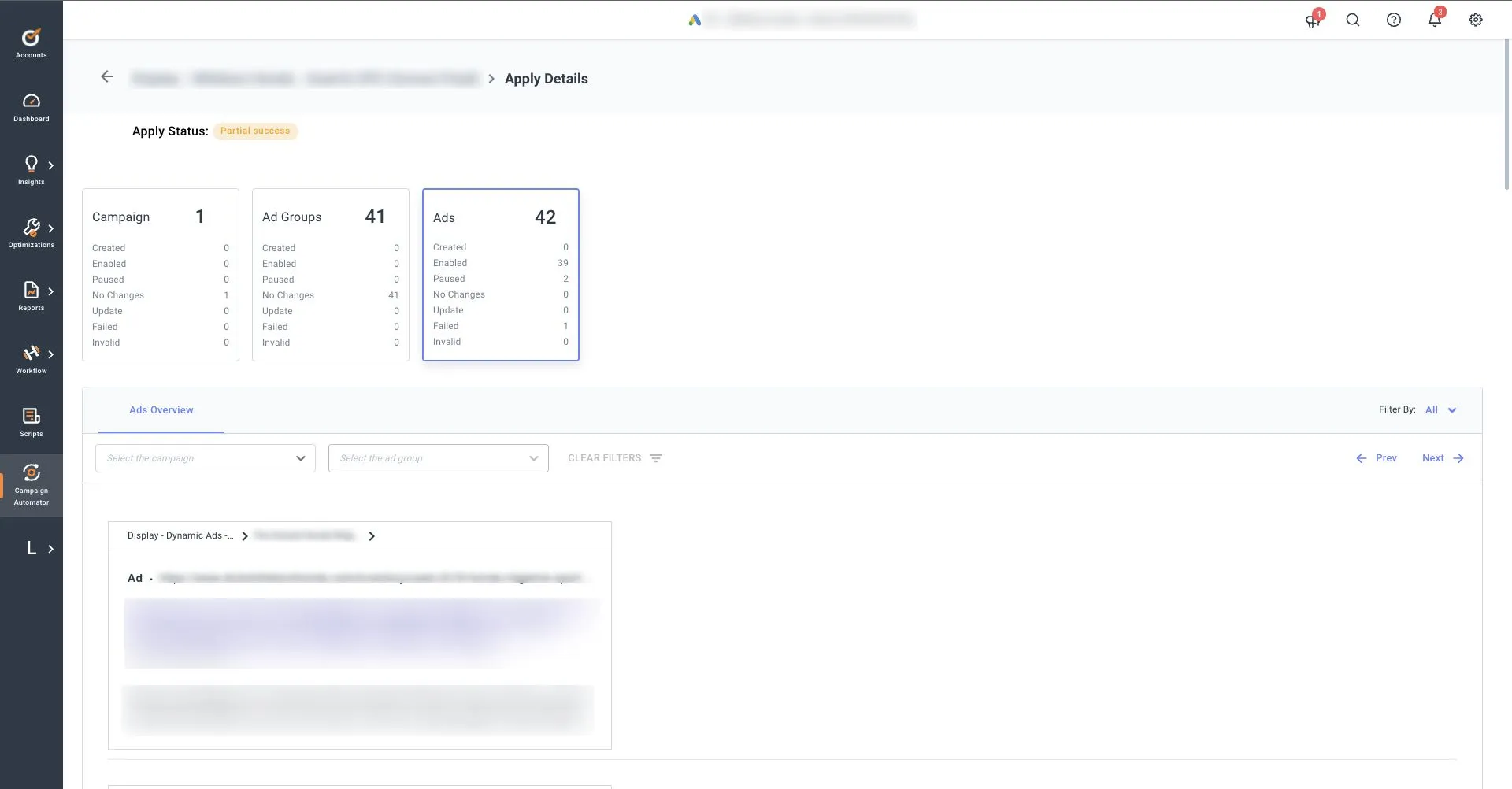
2. Call Ads to replace Call Only Ads
Call Ads are replacing Call Only Ads in the new Google Ads API. We now support the new ad type in Campaign Automator.

3. Call Extensions at campaign and ad group levels
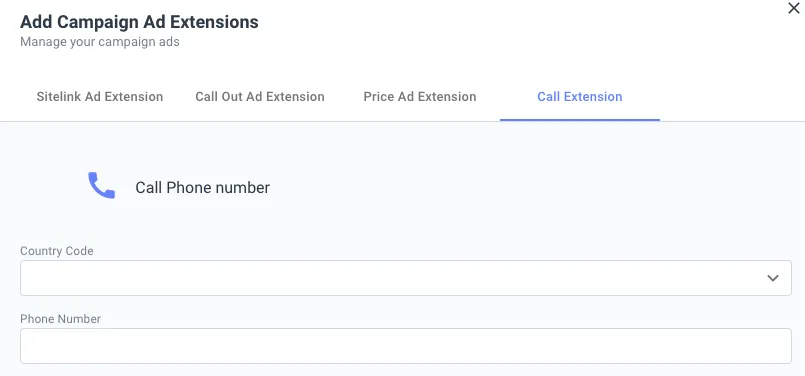
4. Choose where your ads appear
While creating Search campaigns, users can choose between Search Partner Network and Display Network.
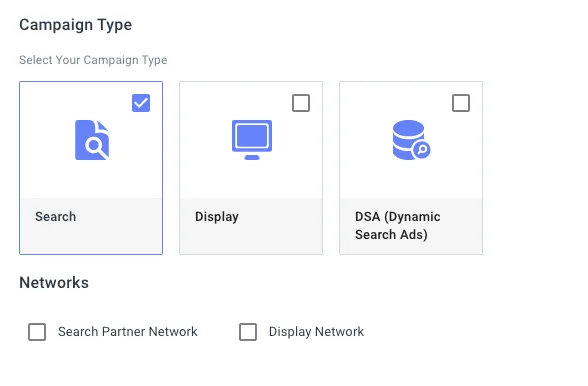
Users can choose from three advanced location options to target or exclude people based on their physical presence or areas of interest:
- Target/Exclude based on presence or interest
- Target/Exclude based on presence
- Target based on search interest
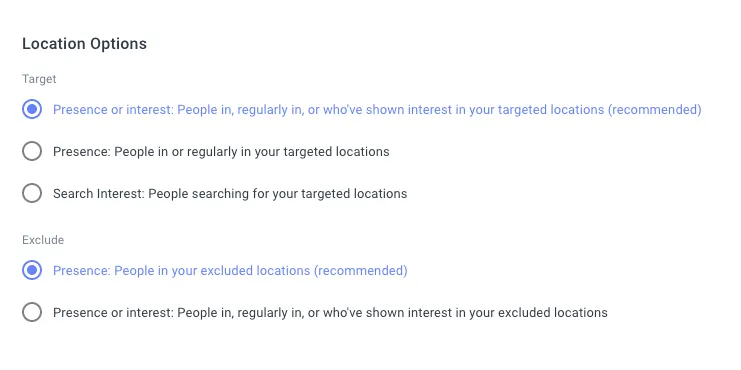
Read the full guide to Campaign Automator capabilities.
Improvements to Segment Scorer
We have two new updates to the Segment Scorer that allow users to:
1. Toggle between viewing only segments that they’ve scored or viewing all segments, including ones that aren’t scored.
2. Search for a particular Segment Name or Segment Value using the Search bar.
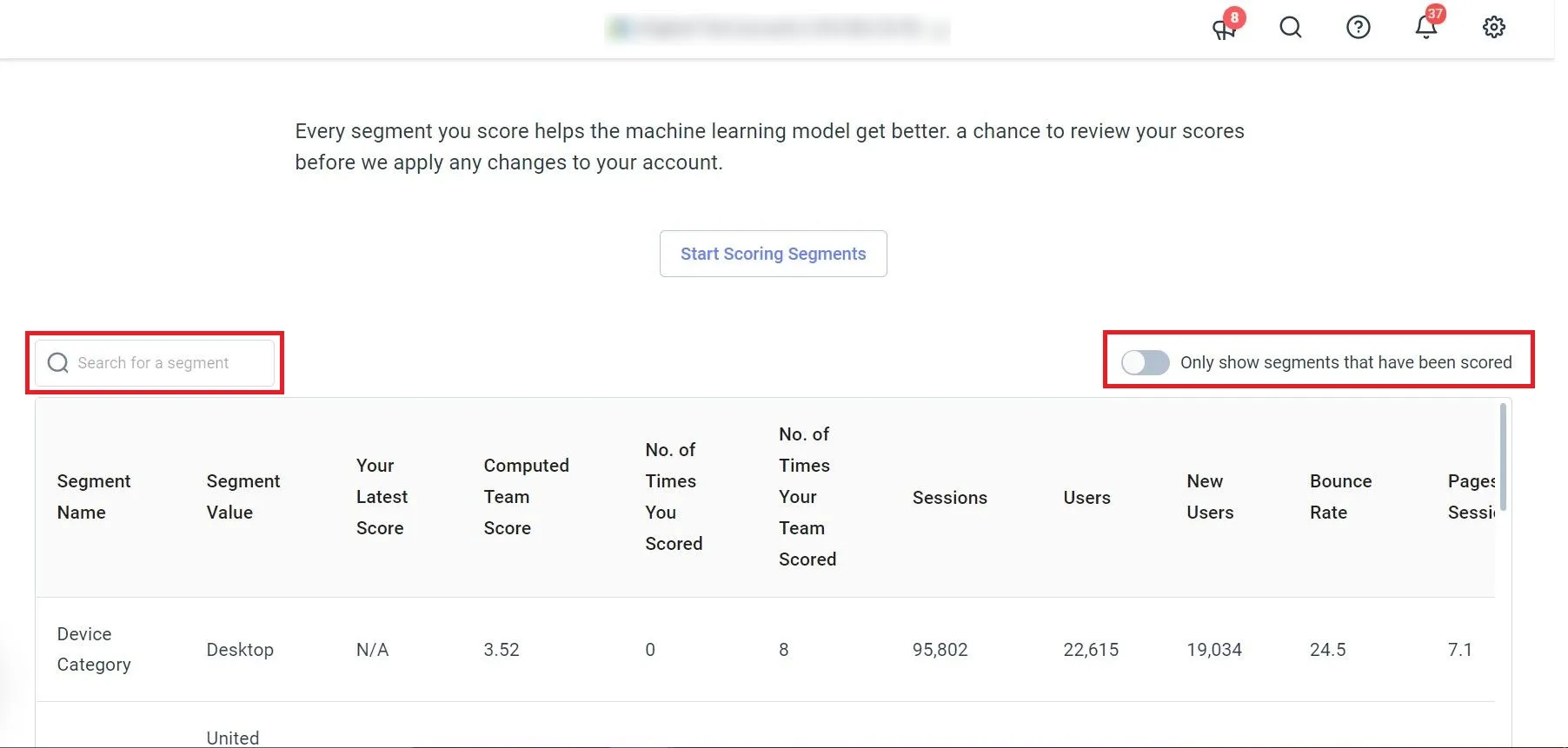
Account Blueprints help users get started with goal-oriented tasks. When creating a Blueprint, users can create a custom task to choose from various Optmyzr tasks.
We’ve added more Optmyzr tools and options to schedule recurring tasks under Blueprints.
Users can now create tasks for the following tools:
- Shopping Campaign Restructure
- Create GRIP Structure
- URL Checker
- Bulk IP Exclusion
- Customer Match List Updates
- Optmyzr Express
- Saved Reports
- Manage Clients
- Save and edit reports
- Covid-19 PPC Analysis
- Segment Scorer
- Shopping Analysis
See what else is in store for the coming months and suggest feature requests on the Optmyzr Roadmap.
Google announced early last year that their AdWords API would stop functioning by April 2022. This would mean quite a few changes for advertisers and ad management tools.
Our engineers are on track with rewriting our code and Optmyzr will continue to support advertisers with great PPC tools.
With much of our efforts focused on the migration, our updates in the month of January included improvements in Microsoft Ads management and getting templates for 2021 Annual Reports ready.
Here’s a roundup of all the key changes to Optmyzr from January 2022.
2021 Annual Report Templates
Are you still spending hours collating data and compiling your 2021 reports? Stop now and take a look at our Annual Report templates. You can get your executive and detailed annual reports for 2021 from the Reports menu.
As always, you can choose a report template that works best for you, and use it as it is or customize it to suit your needs better.
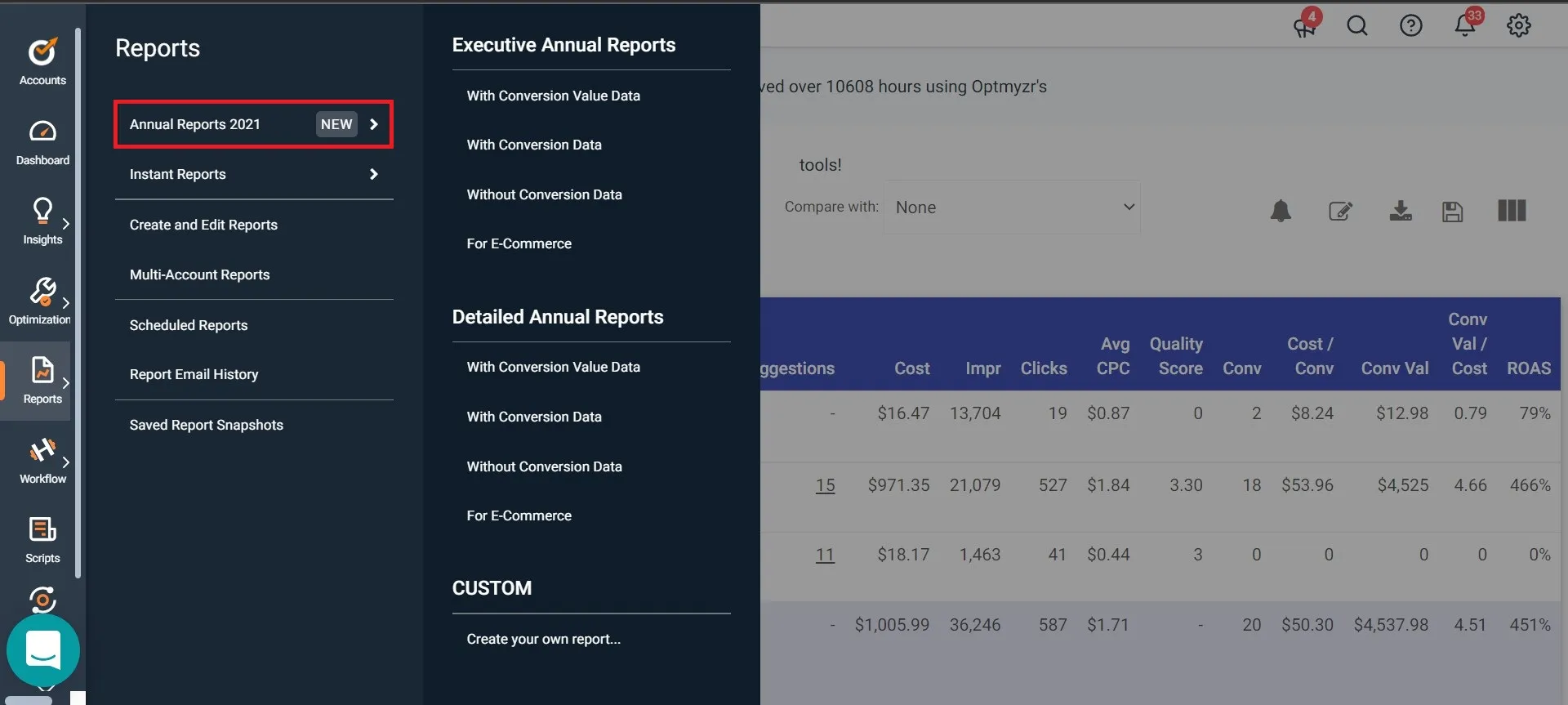
Microsoft Ads Management made easier
For all our Microsoft Ads managers out there, we have a new and improved Account Dashboard UI.
Get a bird’s eye view of how your account is performing, instantly preview and schedule your reports, and filter your data in just a few clicks.
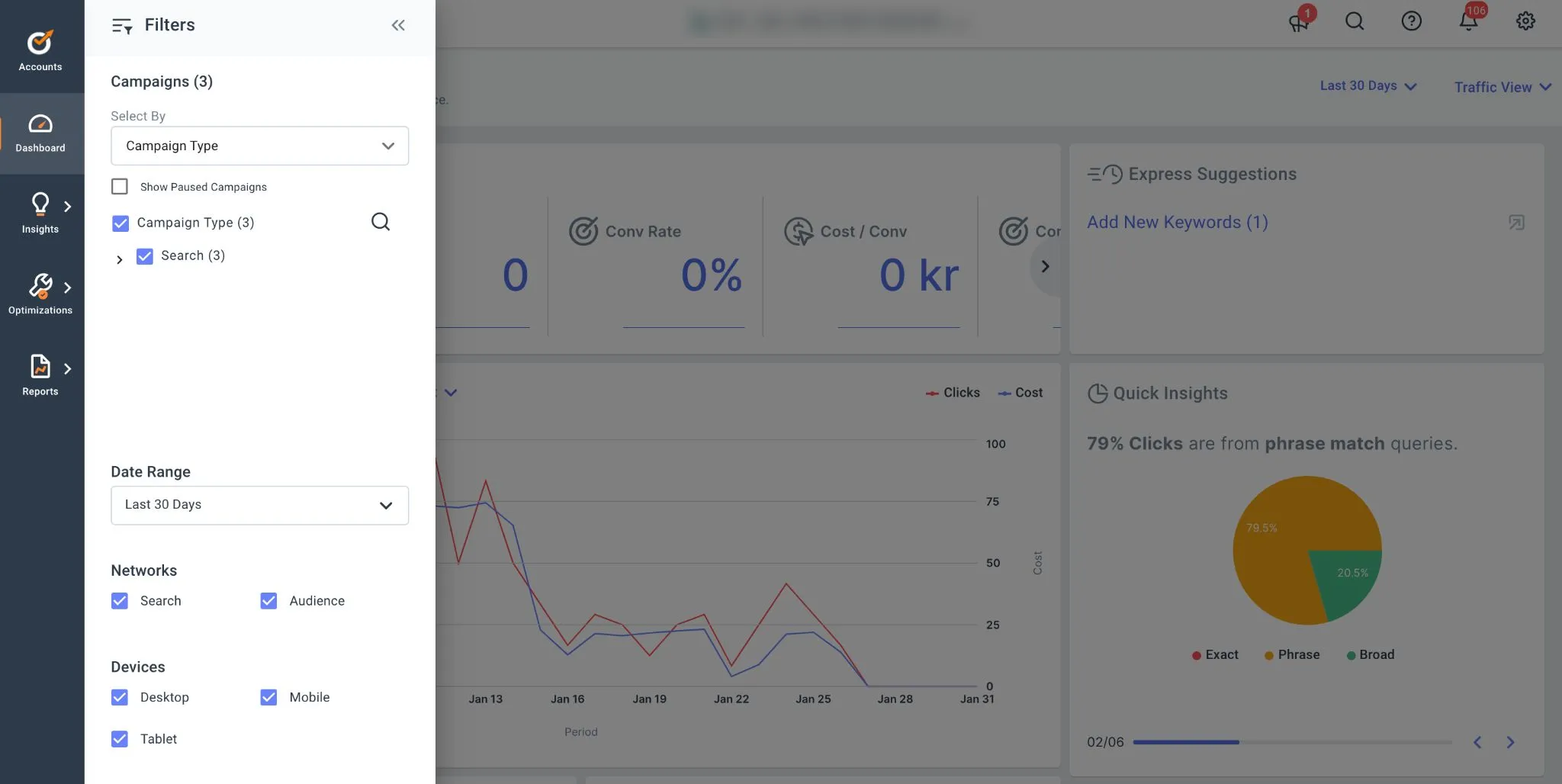
See the Dashboard
Target CPA and Target ROAS modifications for Microsoft Ads
You can now modify and manage your Target CPA and Target ROAS for Microsoft Ads campaigns using Rule Engine.
Go to Rule Engine
No more wasted spend on non-converting placements
What if there was a voice that reminded us of our past errors and told us when we’re about to make a bad decision that’ll end badly for us?
The Potential Wasted Spend metric does just that. The new addition to the Account Level Placement Exclusion Optimization tool tells you how much you’re potentially wasting by having non-converting placements on your account.
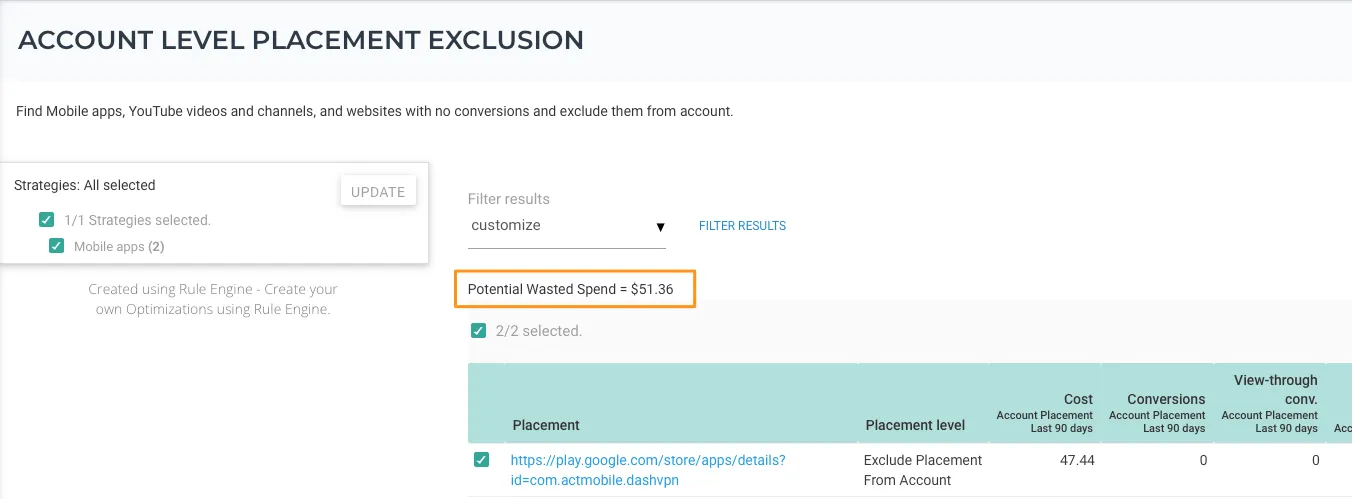
See your Potential Wasted Spend
You can also see what else is in store for the coming months and suggest feature requests on the Optmyzr Roadmap.
So much of our progress in November was centered on making Black Friday Cyber Monday more fruitful for our users. We added new controls for placements with Smart Shopping, included more Facebook Ads data, and provided the first step to better Conversion Value Rules suggestions.
Here’s a roundup of all the key changes to Optmyzr and Campaign Automator during November 2021.
Make account-level placement exclusions.

You can now exclude placements at the account level using Rule Engine. Use this for Smart Shopping and Smart Display campaigns which only respect account-level exclusions.
In the Rule Engine, add a new strategy and navigate to Optimize Placements > Exclude non-converting placements from account.
Go to Rule Engine
Get alerts directly in Microsoft Teams.
Apart from Slack, your team can now be notified directly in Microsoft Teams. Whenever one of your alerts is triggered, your team will be notified there as part of the chat for the Optmyzr app.
Set It Up
Optimize targets at the campaign level.
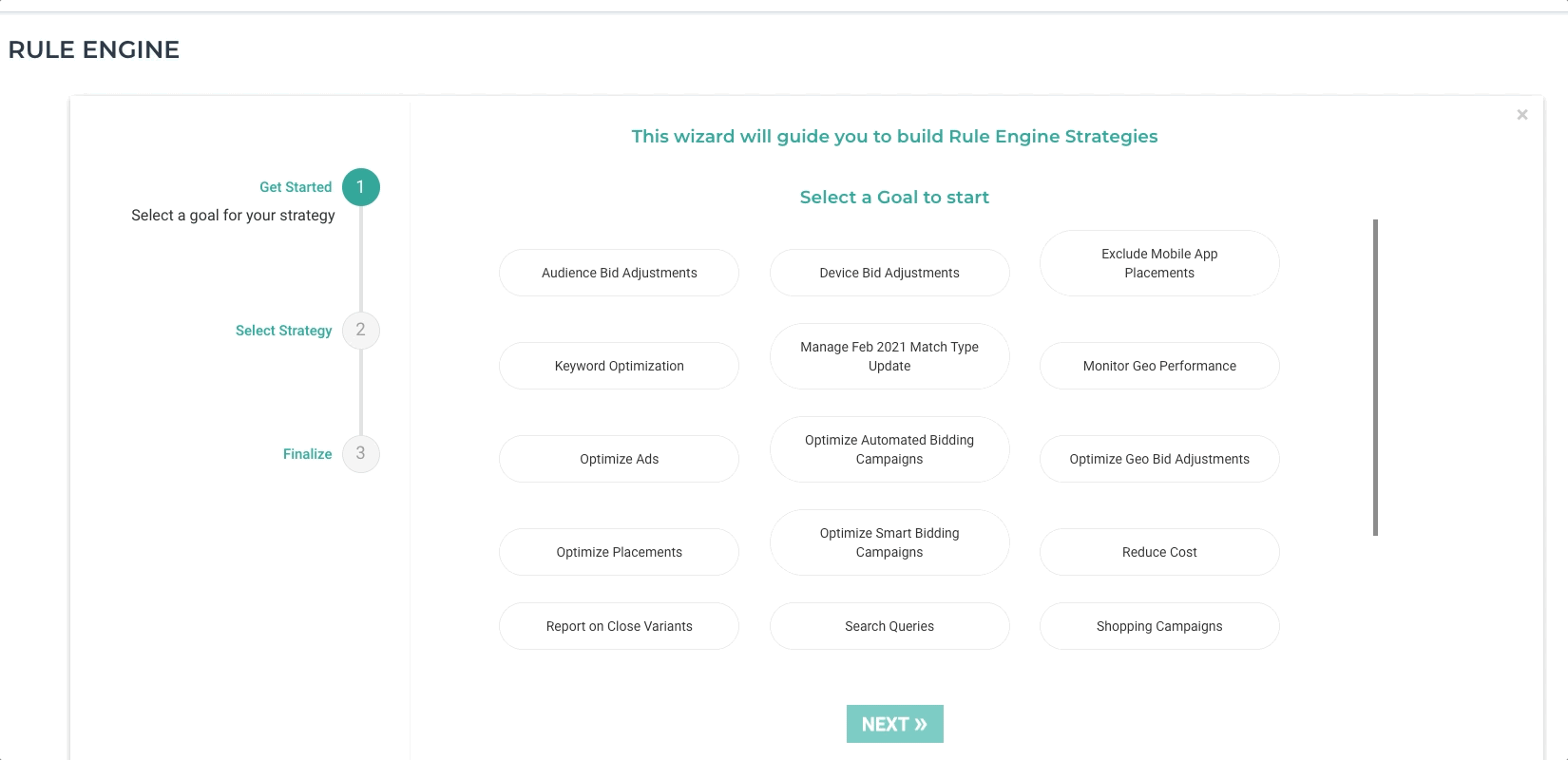
The following Rule Engine pre-built strategies are now available:
1. Optimize Target CPA for campaigns running on Maximize Conversions bidding strategy
2. Optimize Target ROAS for campaigns running on Maximize Conversion Value bidding strategy
You can modify the targets, make sure converting campaigns aren’t losing Impression Share due to ad rank, and reduce the CPA gap.
Go to Rule Engine
More eyes on your Facebook Ads data.

You can now view campaign performance for Facebook Ads in the Optimize Budgets Across Platforms tool, and use conversion data to decide if you’d like to change campaign budgets. Remember, you need to set up a client group before you can use this tool.
You’re also able to view all your platforms, including Facebook Ads, at once in the MCC:
1. See live data for all platforms together
2. Star, add notes, tags, and calculated metrics to help you monitor the performance of select Facebook Ads accounts
The ads widget in our Reporting tool will now show summarized data for an ad in different ad groups or campaigns. Analyze the performance of an ad while looking at a single row, rather than searching across campaigns or ad groups.
Go to Reports
Auto-skip to next Blueprints task if no suggestions are available.
If there are no suggestions available in Account Blueprints during a particular task, you can choose to skip to the next one. The task will be marked as complete, and will respect all other tool settings in any Blueprint.
Go to Account Blueprints
Adjust device bids at the campaign level.
This new Rule Engine scope allows you to apply campaign-level bid adjustments by devices. The update includes the following capabilities:
1. If you haven’t set bid adjustments at the ad group level, the campaign-level adjustments will be inherited by the ad group.
2. A limit of -100% at the campaign level will ignore any ad group-level bid adjustment.
Adjust Bids by Device
Add ASIN search terms as negative products in Amazon Ads.
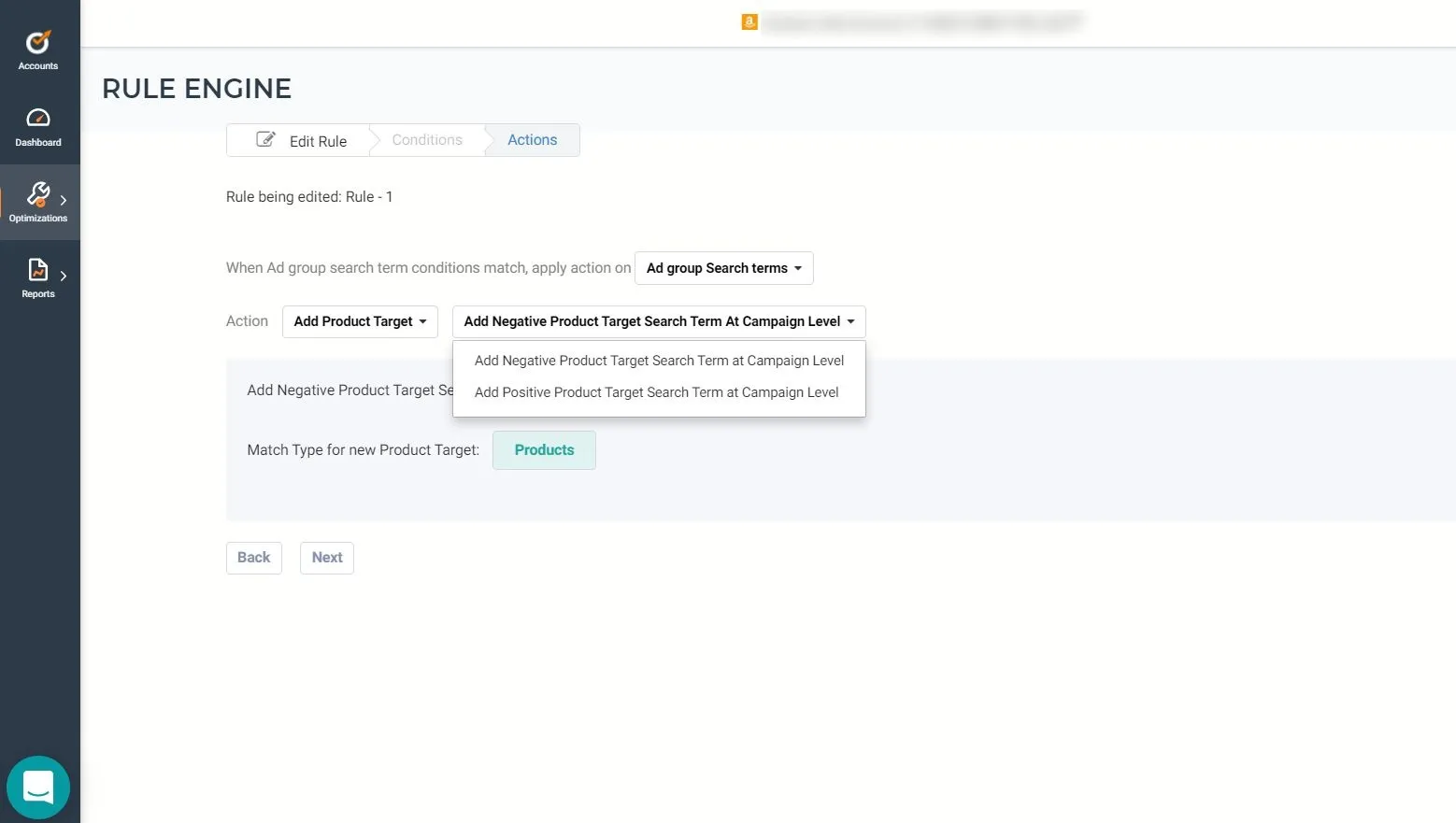
You can now add Search Terms (specifically ASINs) as Negative Product Targets using the ‘Search Terms’ scope of Rule Engine for Amazon.
This new action allows for more granular filtering based on performance, and lets you add unwanted ASIN search terms as negative products.
Please note that as was the case earlier, you can only see search terms for campaigns on manual targeting.
Go to Rule Engine
Select and copy multiple Rule Engine strategies at once.
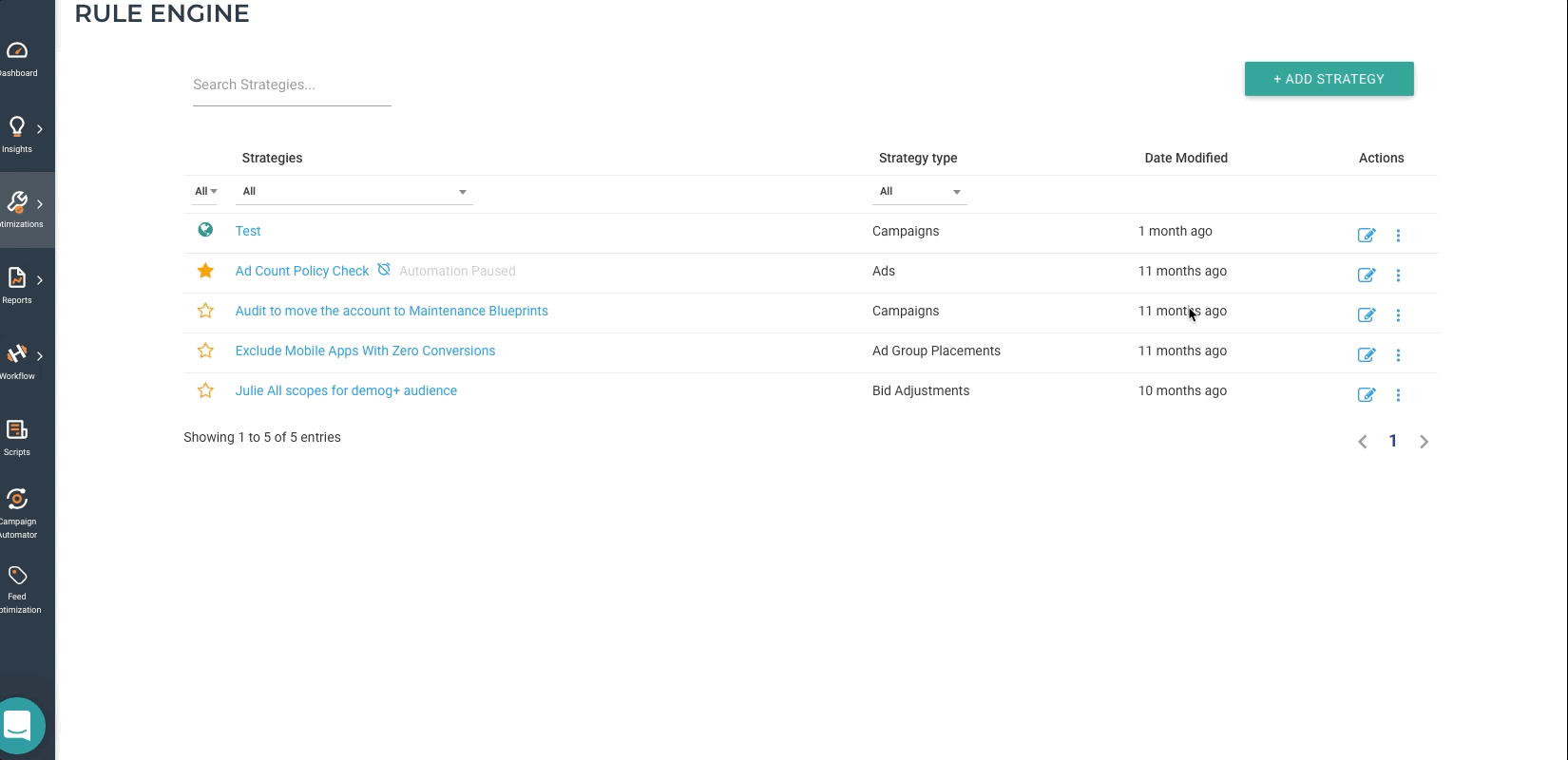
No more copying strategies one by one in the Rule Engine. You can now select and copy multiple strategies in one go, even across your accounts.
Go to Rule Engine
BONUS: Score audience segments to get Conversion Value Rules suggestions.
Our new Segment Scorer allows you to rate Segments based on how well they perform when you get a conversion from them. You do this by assigning a number between 1 (lowest) and 5 (highest).
Once we get enough scores from your team, we’ll use that data to suggest Conversion Value Rules that will help optimize your account’s performance by teaching Google’s automations (like those that handle bidding) more about what’s valuable to your business.
Start Scoring Segments
Our Q4 kickoff revolved around one core objective: making life less stressful and more manageable for PPC experts.
Here’s a roundup of all the key changes to Optmyzr and Campaign Automator during October 2021.
More actionable Slack notifications
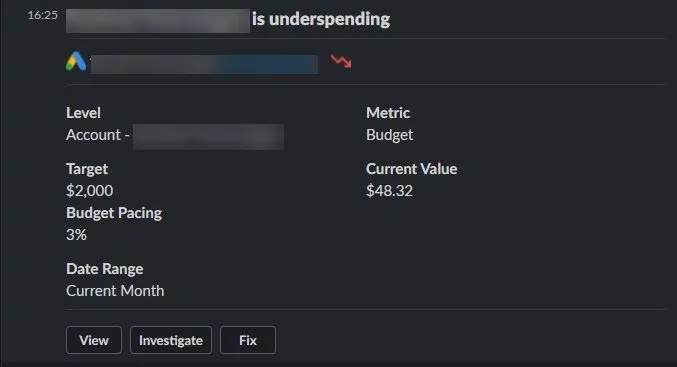
A few months ago, we made it so you could receive alert notifications in Slack. Today, those notifications also include:
- More information on current and target values
- Links to Optmyzr tools that help you fix the issue or investigate further.
BONUS: You can also opt to receive notifications in Microsoft Teams. Here’s how.
Set conditions to stop automated report delivery.

Report automation makes sure your clients and stakeholders get timely performance updates. But sometimes, performance can be unusual and warrant further context.
To prevent misunderstandings instead of needing to clear them up, you can now set thresholds where an automated report will not be sent as previously scheduled.
If these conditions are met (e.g. conversions < 1,000), the report will be sent only to the schedule owner on your team. If they are not met, the report will be sent as usual to all recipients.
Use this feature to prevent reports from going out when additional context is required for unusual performance.
Visit the Report Schedule page, then select ‘Edit Schedule’ from the vertical bar next to any scheduled report. Conditions will be at the bottom and are set to none by default.
Monitor alerts for conversion metrics in Facebook.
Facebook and Apple might be at loggerheads, but you shouldn’t get caught in the crossfire. To give you sharper eyes your Facebook Ads campaigns, you can set up custom alerts at the account or campaign level for the following KPIs:
- Conversions
- Conversion Value
- Conv. Value/Click
- Conv. Value/Cost
You can also choose to notify multiple team members or redirect your own notifications to avoid clutter.
Set them up now.
Our AB Testing for Ads tool now allows you to filter data by custom date ranges. This change applies to both Google Ads and Microsoft Ads accounts.
Check it out.
You can now change the Price/ROAS ranges and conversion thresholds for shopping campaigns created in Optmyzr via the Shopping Refresher tool or in automation schedules. There are some limitations and extensions to this update:
1. You can adjust ROAS ranges but not the number of campaigns.
2. Conversion thresholds can be changed in ROAS build-outs.
3. Price ranges can be changed in Price build-outs.
Go to the Shopping Refresher.
Bonus: Improvements to the Account Dashboard
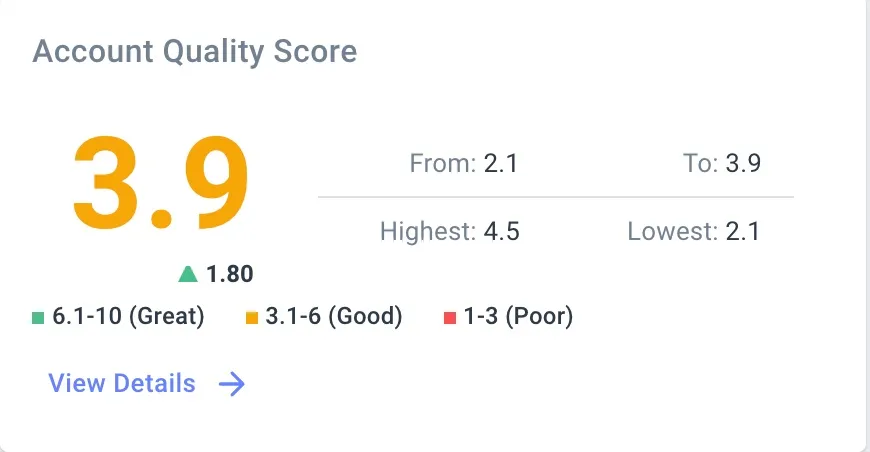
We’ve made two significant improvements to the Account Dashboard. You can now:
1. View due and overdue tasks, with a dropdown option to switch between accounts. Stay on top of what needs doing.
2. See account-level Quality Score data for a Google Ads account displayed on the Account Dashboard. Pair with an alert to always stay at your best.
Take a look.
It’s been a busy quarter for us at Optmyzr, building PPC tools that help save time and hassle. From keeping up with keyword match type updates to capabilities that will serve you well in the years to come, we’ve got plenty to share.
So here are all the major updates to Optmyzr from the past 3 months. Let’s look at some of the big ticket items from this past quarter, and you can find the full list of other fixes and improvements below that. Just click the menu items on the left side to navigate easily!
Track your testing easily with Campaign Experiments.
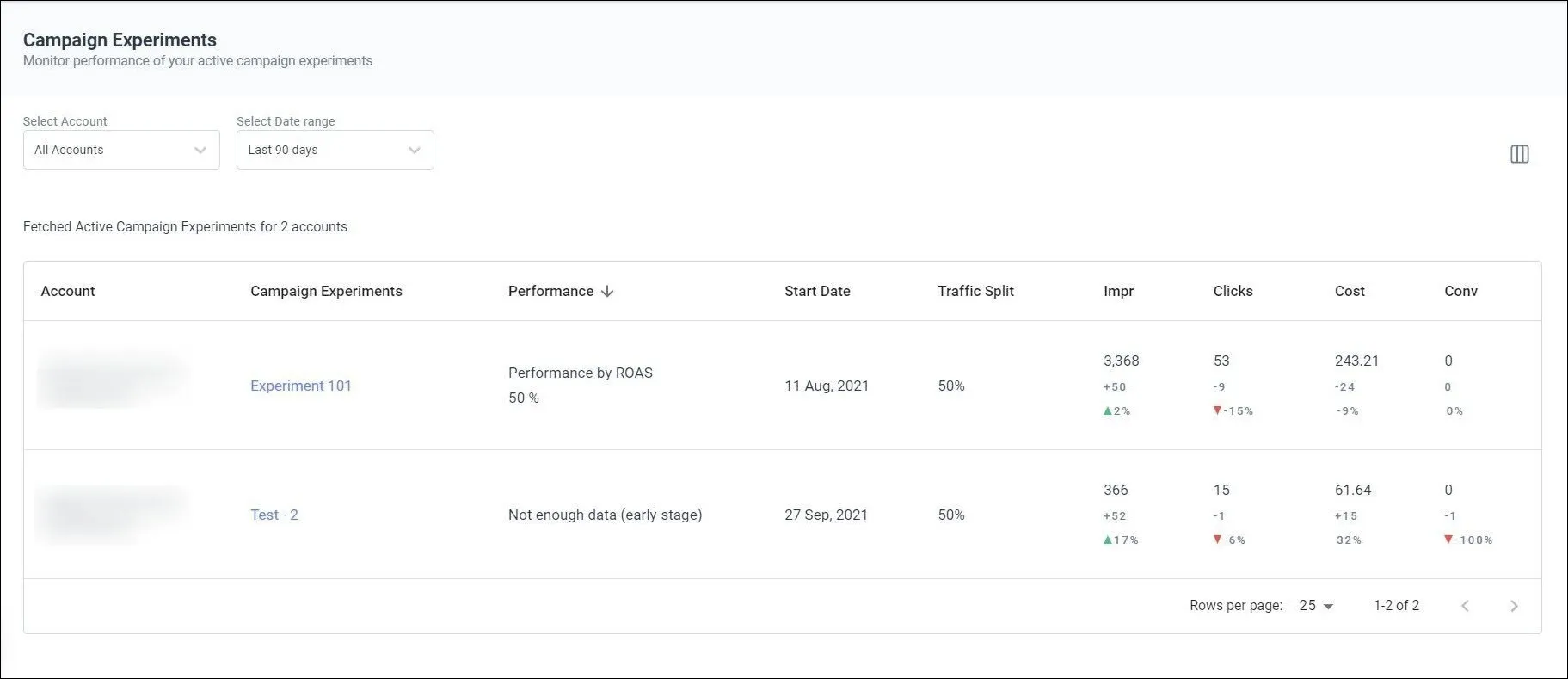
Tracking your PPC experiments through Google Ads can be annoying. The interface doesn’t allow you to easily track test campaigns, their changes, or even remind you that you have any running.
Campaign Experiments in Optmyzr goes a long way in solving those challenges, and we’re only getting started with it.
Now you can analyze the performance of active experiments across all your Google Ads accounts. Find winning and losing experiments, and apply or end them in a single click.
Optmyzr compares your experiment and its original campaign based on statistically significant data to highlight whether the experiment is winning.
This feature is now live for all subscribers on one of our currently listed plans. If you’re on one of our older plans, contact support to find out how to get access.
Dig deeper into Analytics data with the Segment Explorer.
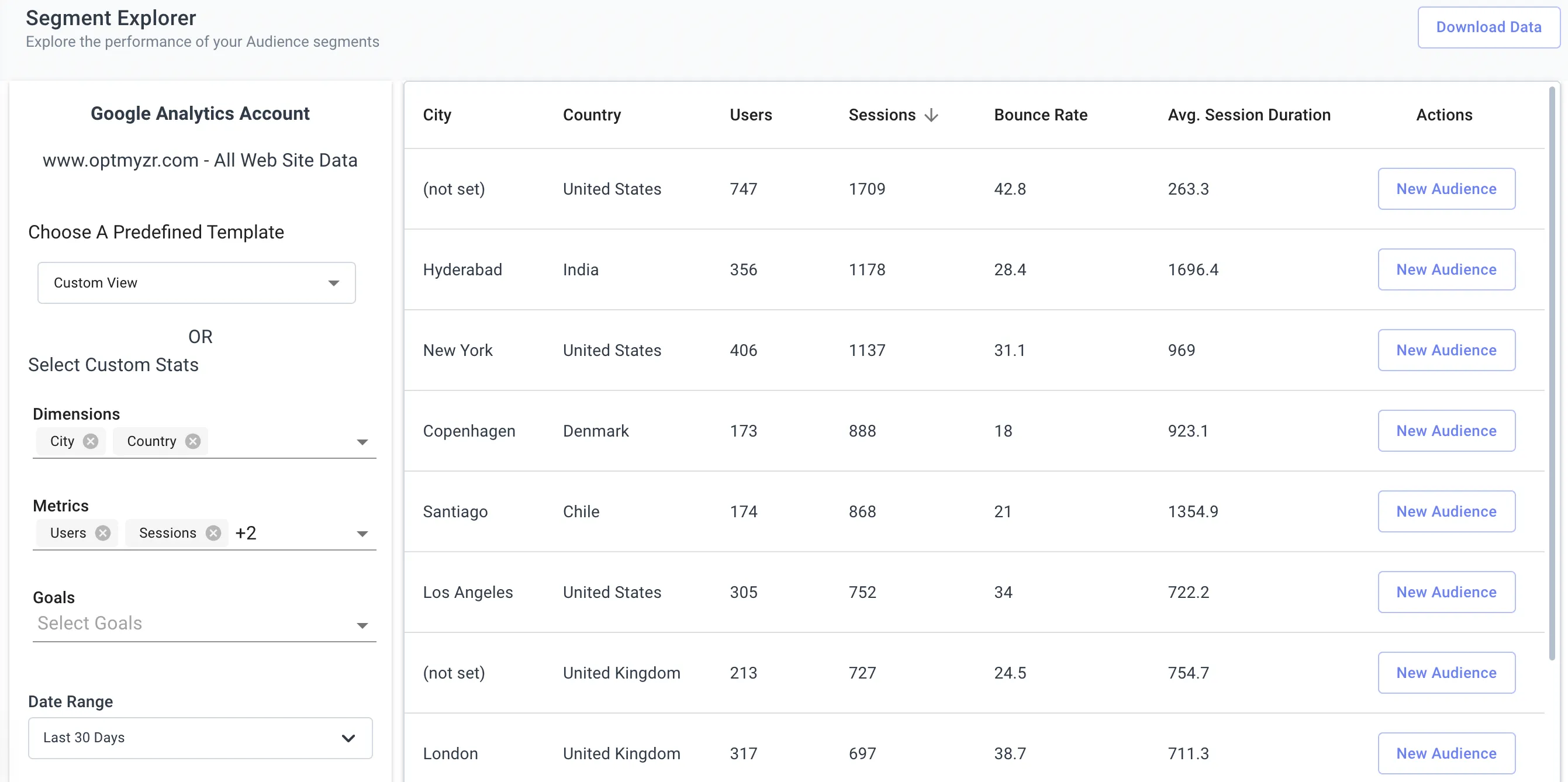
Google Analytics makes it difficult to view performance data for multiple audience segments at a time – like sessions from male users via mobile in the US.
Introducing the Segment Explorer, our latest tool that lets you view performance metrics for all your connected Google Analytics accounts for multiple dimensions combined at once. Segment Explorer allows you to add different audience segments to your view data in a straightforward way.
Please note that not all combinations of segments (dimensions) are allowed through the API. Selecting an invalid combination will display an error message.
Get involved with our product on the Optmyzr Roadmap.
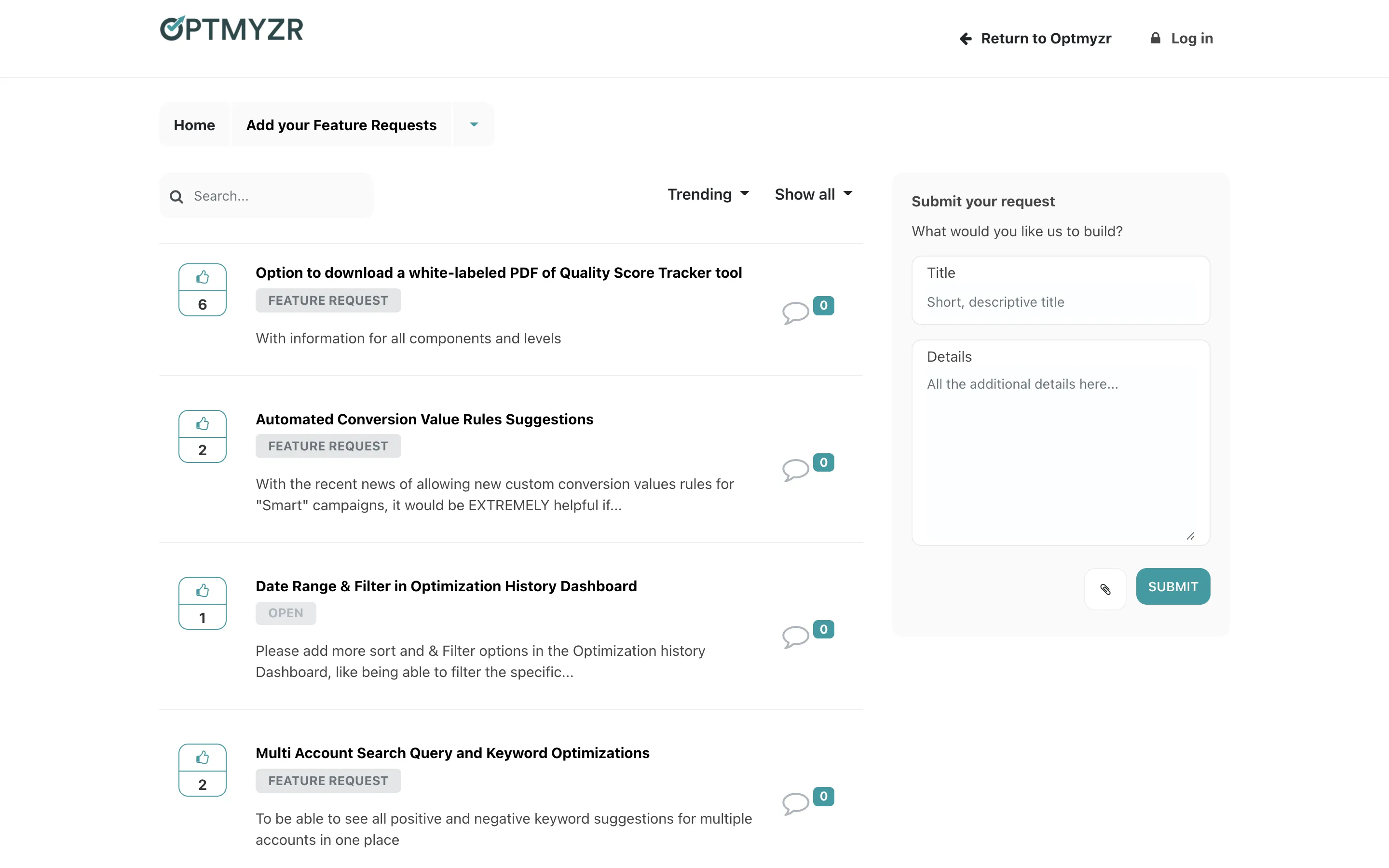
Optmyzr now has our own Roadmap page to further align our plans for our software with what PPC managers and strategists actually want. On this page, you can:
- View our product roadmap
- Make feature requests
- View other people’s requests
- Vote and comment on items
Go there now to make a request, vote on what others have asked for, and to see what’s made the cut to become part of our plans!
Updates from September 2021
1. New-look account dashboard
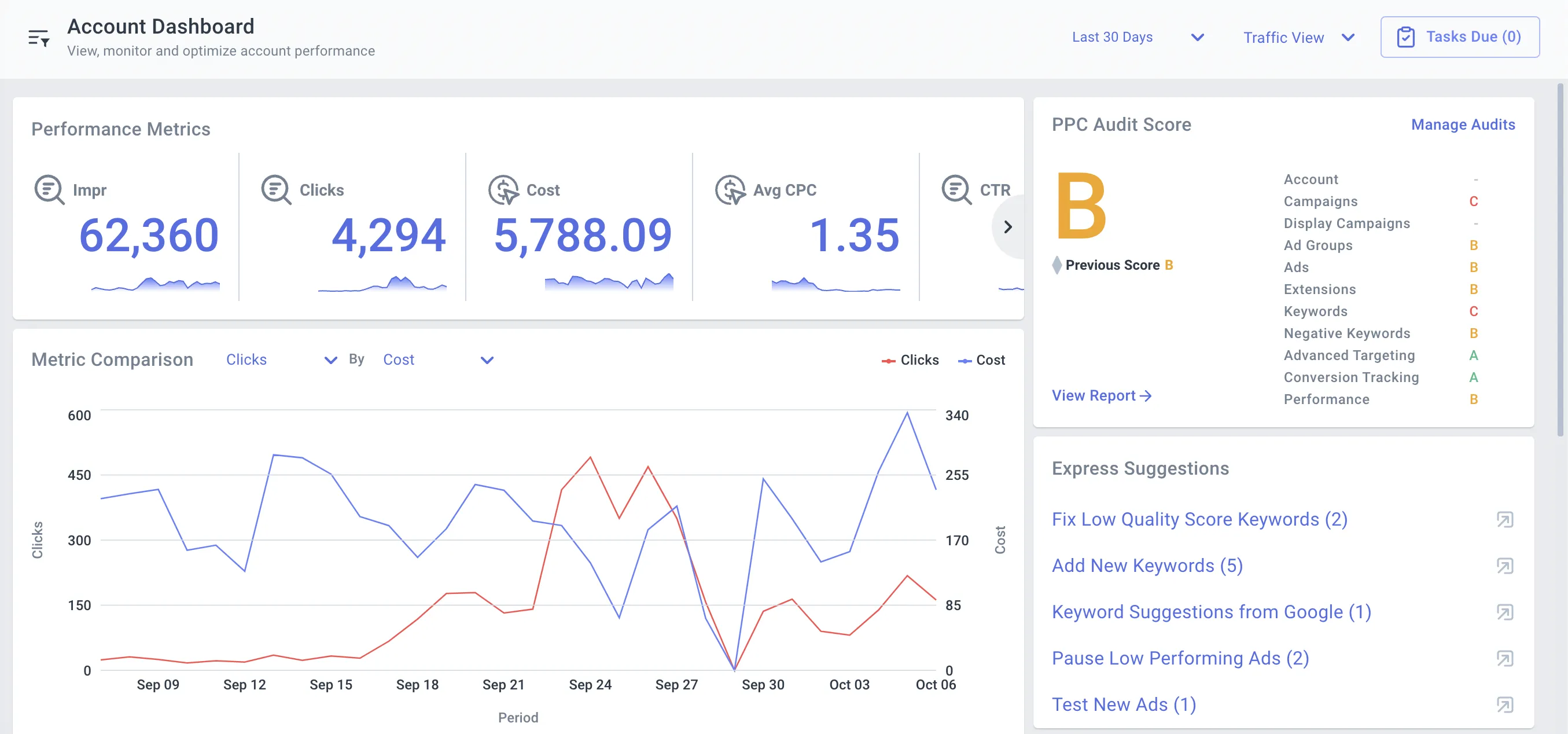
Introducing a brand new design and functionalities on the Account Dashboard for better and faster visualization. New capabilities include:
- See changes in account PPC audit score and get info on grades for different levels (campaign, keywords, etc)
- See data based on campaign type, bid strategy, or campaign groups; select any of these new filters in the left-side menu
- Top elements get extended into a full table to see all data for more metrics
- View and run Blueprints tasks that are due and overdue for your account
2. Download white-label PDFs of Quality Score Tracker data.
This new feature allows you to easily download and share all information available in the Quality Score Tracker. Click the download icon on the top right, and select ‘Save PDF’.
3. Edit the schedule owner for your reports
You can now change the owners for report schedules for Google Ads, Amazon Ads, Microsoft Ads, and Facebook Ads – either one at a time or in bulk.
This feature is only available if you are the owner of your team’s account.
4. See difference in performance in KPI Widgets
You can now see the total numeric difference between two periods being compared in KPI widgets. Change value is indicated with corresponding arrow signs.
This is available for use with Google Ads, Microsoft Ads, Amazon Ads, and Facebook Ads accounts.
5. Pick multiple values in the Rule Engine
The Rule Engine now supports multiple values when applying the “contains”, “does not contain” and “ignore case” conditions.
Search for multiple values of an attribute rather than creating separate conditions for each one.
6. Adjust bids by campaign placement for Amazon Ads
You can now see Amazon Ads performance based on placements and adjust bids (by %) for corresponding placements.
For Sponsored Products, adjustments can be made for Top of Search and Product Pages placements.
For Sponsored Brands, adjustments can be made for All Placements below Top of Search.
This improvement helps you adjust bids by placements in a more granular way than the Amazon Ads interface, as our Rule Engine lets you filter by any condition that suits your needs.
Updates from July & August 2021
New in the Rule Engine
1. SA360 conversion data now supported in the Rule Engine
Search Ads 360 actions and transactions are available in the Rule Engine for linked Google Ads accounts. Use this to gain extra insight from SA360 actions/transactions to make informed decisions. Learn More
2. Find text anywhere in ads with the Rule Engine
We added the ‘Any headline/description/path’ to Rule Engine strategies for ads.
You can now easily search for specific text anywhere in your ad instead of creating separate conditions for headline, description or path. This new attribute looks for your selected text in all components at once.
3. Add multiple values to Rule Engine conditions
We’ve added the operators ‘In’ and ‘Not In’ to the Rule Engine. This lets you create or modify rules without having to create multiple conditions using ‘Is’ or ‘Is Not’.
4. Quickly find restricted keywords in Rule Engine
We added the Serving Status attribute to the Rule Engine to help you easily identify keywords in your account with low search query volume.
New in PPC Investigator
1. Easily compare to same period of previous month in Optmyzr
Reporting widgets and PPC Investigator now support the “same period previous month” option to compare data sets.
If you now wish to compare performance data from August 1-6 with data from July 1-6, simply select this option instead of a custom date range.
New for Optimizing Ads
1. Filter by ad count when you use A/B Testing
You can now filter by ad count in the A/B Testing for Ads tool. View only those ad groups with fewer/more than a specific number of ads, or apply a range.
You no longer need to struggle to identify single keyword ad groups, or ones with a certain number of ads in them.
2. Find and label ads with low CTR
We added a new pre-built strategy in the Rule Engine to help you find ads that have a click-through rate lower than the ad group average.
Go to Rule Engine > Optimize Ads > Find Ads with Low CTR to identify and label these ads.
New for Optimizing Keywords
1. Pause keywords with low QS in Google Ads
A new Rule Engine strategy is available: Monitor Quality Score Components for Keywords.
This strategy suggests keywords with a low QS (<3) and/or low-ranked QS components, allowing you to pause them with a click. You can also add labels to these keywords to analyze and resolve issues.
2. See keywords on automated bidding that aren’t making the first page
The First Page Bridger now shows you keywords on automated bidding that aren’t making it to the first page. While you still can’t adjust bids for these keywords, you can use the information to make other decisions.
And because the list of keywords opens up in the Rule Engine, you can automate this check to occur as often as you need it to.
New for Optimizing Budgets
1. Impression Share metrics added for multi-platform budgets
Four new Impression Share metrics have been added to the Optimize Budgets Across Platforms tool:
- Search IS lost (budget)
- Search IS lost (rank)
- Display IS lost (budget)
- Display IS lost (rank)
2. See impression share lost due to rank when optimizing budgets
Recent IS Loss (Rank) has been added to the Optimize Budget tool, along with Recent IS Loss (Budget). View both and make informed decisions when optimizing your Google Ads budget.
3. More control to limit multi-platform overspending
Optimize Budgets Across Platforms now pauses the campaigns of a budget group if their shared monthly target is reached, and re-enables them on the 1st of the next month.
New for Managing Workflows
1. Contextual help to improve your PPC Audit grade
We’ve added additional contextual help to each widget section when you review your PPC Audit report.
You’ll see a brief explanation of why we recommend certain fixes, additional context from Google Ads, and tips on which tool in Optmyzr can help you improve your audit grade.
2. Send audit reports in a click
There’s now a faster way to share reports from the PPC Audits tool. Just use the new ‘send email’ button without needing to schedule delivery.
3. Snooze tasks that aren’t a priority
Getting suggestions you don’t want to see? You can now snooze tasks in the suggestions sidebar on the MCC dashboard for a day, a week, a month, or a year.
The task will no longer show or be counted toward the total suggestions for that account. It will still be available in-tool, in Optmyzr Express, and for other users in the team.
4. Get Slack alerts for Rule Engine strategies
If you have Slack integration enabled, you can now set up alerts when your Rule Engine strategies have new suggestions.
New in Account Blueprints
1. Easily manage team roles for Blueprints
You can now manage Account Blueprints roles for all your team members. Assign roles in bulk, create new ones, and change someone’s role without needing to enter the Blueprint wizard.
2. More control over how you build Blueprints
We now support both scheduled (paused or active) and on-demand Account Blueprints. You can create a Blueprint without scheduling tasks and run them on demand. New options include:
- Create Blueprints in either format (scheduled and on-demand)
- Add pre-built Blueprints to your account in either format
- Assign multiple tasks to a role in scheduled Blueprints
- Select tasks in bulk and assign them a frequency in scheduled Blueprints.
- Convert scheduled Blueprints to on-demand and vice-versa
- Search for Blueprints by name
- Filter Blueprints by format/type
New for Microsoft Ads
1. Changes to Broad Match Modifier support for Microsoft Ads
The addition of keywords using the Broad Match Modifier match type is longer supported for Microsoft Ads in the Keyword Lasso and Optmyzr Express tools.
Existing BMM keywords will continue to serve under the new Phrase Match behavior.
2. Greater control for search terms and spend in Microsoft Ads
We’ve added two new pre-built strategies to the Rule Engine for Microsoft Ads:
- New and Declining Search Queries Report to monitor significant changes in the performance of a search query
- Pause Low Quality Score Keywords to avoid spending on keywords with low QS and no conversions
3. New metrics for Microsoft Ads
In line with a recent Microsoft Ads update, Average Position has been removed and 6 new metrics have been added in its place:
- Top impression share
- Top impression share lost to rank
- Top impression share lost to budget
- Absolute top impression share
- Absolute top impression share lost to rank
- Absolute top impression share lost to budget
You can now see the new metrics in Rule Engine and create custom strategies with them.
New in Campaign Automator
1. Broad Match Modified removed from Campaign Automator
The Broad Match Modified match type option for keywords is grayed out in all Campaign Automator templates.
You can also bulk-edit keyword match type from BMM to Phrase Match for as many Campaign Automator templates as you need to.
Keywords already operating under BMM still show, but no new keywords can be added under BMM.
2. Bulk edits for Campaign Automator
You can now make the following bulk edits in Campaign Automator:
- Replace a column header. If the column name in your source file has changed, use this option to change it in your CA template as well.
- Replace text. IMPORTANT – this feature is case-sensitive and replaces any occurrence of the text, irrespective of spacing. So replacing “shoes” with “sneakers” will result in:
- Buy shoes at the lowest price → Buy sneakers at the lowest price
- Buy blackshoes now → Buy blacksneakers now
- Buy running Shoes → no change
3. Apply campaign & ad group labels
You can now add static labels like ‘Test 1’ or ‘Optmyzr’, or use dynamic insertion to create labels like {Brand} or {Category}. Each variation will be added to the applicable entities.
4. Create Responsive Display Ads
Campaign Automator now supports the creation of Responsive Display Ads.
Regular Pages
Smooth seas never made a skilled sailor, and 2022 was anything but smooth. From Google’s automation updates and several tech migrations, there was much to get used to.
Well done on getting through a choppy year, and to the start of a new opportunity.
For us, things haven’t changed in 2023. Not really.
Amidst the uncertainty in the PPC world, you can always count on Optmyzr to do what’s right for you. Our capabilities may evolve with the ad platforms, but fundamentally we’ll always be what PPC marketers need.
In 2022, our product roadmap restored some of the control and visibility you lost when Google made the shift to responsive search ads and Performance Max.
Behind the scenes, our team worked tirelessly on the migration to the new Google Ads API to make sure we didn’t abandon you when you need us most.
So when we say that our customers are priority #1, we mean it. Optmyzr wouldn’t be where we are — celebrating our 10th year in business — without you.
This year, we have a lot of exciting things already in progress: added capabilities for platforms beyond Google, integrations with other marketing tools, new layers of automation, and more.
But first, let’s look at the biggest updates of 2022.
Here’s a quick look at our top products for the year 2022 and a sneak peek into this year’s roadmap.
Top Updates of 2022
Optimization Updates
Stay on top of broken URLs in Google Ads
The URL Checker utility has been upgraded with an improved workflow, making it easier to create and manage settings. You can now pause ads and keywords linking to broken URLs, and re-enable these entities in a future run if the issues are fixed.
Go to URL Checker
Get PMax listing groups data in ‘Top Product & Listing Groups’ widget
We’ve updated the Top Product & Listing Groups Widget for Google Ads to include top listing groups data from your Performance Max campaigns. It makes your Shopping product groups and Performance Max listing groups accessible under one interface.
As a reminder, you could see data earlier for both Standard and Smart Shopping campaigns. Performance Max has taken the place of Smart Shopping.
Go to Reports
Sponsored Brand video data now in Amazon tools
Campaign data for Sponsored Brand videos is now included in dashboards and reports for your Amazon PPC accounts. This removes the inconsistency in data for this campaign type.
Audits and Analysis Updates
Perform root cause analysis for Microsoft Ads
PPC Investigator now has more capabilities to analyze Microsoft Ads accounts.
After picking a metric to investigate, Root Cause Analysis can now highlight specific campaigns, ad groups, product partitions, keywords, and other elements responsible for the change in performance.
Go to PPC Investigator
Cause analysis for Amazon Ads
We’ve added the PPC Investigator cause chart to Amazon Ads insights. You can now conduct in-depth analysis of any performance changes.
Go to dashboard
Get keyword suggestions from Keyword Planner
In the Keyword Lasso tool, you can now select ‘Keyword Planner’ as a source of new keywords using the drop-down menu at the top of the page. Read more about it in our help documentation.
Go to Keyword Lasso
UI improvements to Alerts settings
We’ve released a friendlier interface for our Alerts settings page that includes capabilities such as:
- Create alerts in bulk more easily
- Select all the accounts you want at once
- Support for monthly budget alerts for Amazon and Facebook accounts
- An easier way to create and edit multi-account budget alerts
Go to Alerts
New account dashboard UI for Microsoft Ads
New capabilities include:
- Account Performance Reports: You can choose from our 3 instant report templates, preview them, and schedule them in just a few clicks.
- Data Filters: You can now see data based on Campaign Type or Bid strategy and use one of these new scopes to segment and analyze your data.
Go to Account Dashboard
Evaluate Performance Max campaigns with 8 new audits
We’ve added 8 new audits to help maintain and improve the quality of your Performance Max campaigns. With these, you can easily identify gaps in asset groups and individual assets in terms of their structure and performance.
For example, now you can start using Performance Labels to assess various PMax assets and find asset groups with insufficient headlines, descriptions, images, and more.
Go to PPC Audits
Regularly audit and get quick, actionable insights on MS account health
Use the PPC Policy and Audits tool under the Insights section to identify different problem areas in your Microsoft Ads accounts, as well as to find optimization opportunities for your ads, campaigns, keywords, and more.
Go to PPC Audits
Visualize your Google Ads performance with funnel charts
For Google Ads accounts, the funnel chart feature is accessible in both single and multi-account reports.
Starting with impressions at the top of the funnel, clicks in the middle, and working your way down to conversions, you can easily visualize the performance at different stages of the ad journey.
Go to Reports
New Shopping Feed Audits capabilities
With our new audit feature, you can be proactive rather than reactive when it comes to optimizing shopping ads.
Here’s how you could improve the overall quality of shopping ads and resolve potential issues in the Google Merchant Center feed ahead of time:
- Identify missing values and fields
- Find disapproved products with reasons
- Get suggestions to improve feed quality
The audit examines all of GMC’s parameters, so you can make the necessary adjustments before the problem arises.
Go to insights
Migration and Other Support for RSAs
Free script to turn ETAs into RSAs
Make sure all your ad groups have responsive search ads, even after the July deprecation of expanded text ads.
Our new script builds a bulk sheet with new RSAs for your entire account. It pulls text from existing ads and adds them as assets to suggested new RSAs.
Simply taking existing text from ETAs and adding them to new RSAs in existing ad groups can boost conversions by up to 7% at a similar CPA or ROAS.
Get the script
Optimize your RSA ad copy
Our popular Ad Text Optimization tool now has a version for responsive search ads.
As a hybrid insight and optimization tool, it’ll allow you to both review RSA performance data and modify text components (like headlines and descriptions), individually or in bulk.
Read help documentation
Preview and add Google RSAs and RDAs directly from audits
If you’ve previously run an audit to find out which ad groups have fewer than two responsive search ads, clicking on the ad group name renders a preview of existing ads and their performance.
You’ll also be able to create new responsive search ads, call ads, responsive display ads, or expanded dynamic search ads (depending on campaign type).
Go to PPC Audits
Better your Google Ads performance with 10 new RSA audits
Easily spot gaps and inconsistencies in your RSA assets, and make changes wherever needed. We’ve got 10 new audits to help you identify and resolve potential issues.
Go to PPC Audits
Open AI text suggestions for RSAs
Get new headline and description suggestions for Google and Microsoft responsive search ads.
When selecting this option, you’ll get top suggestions for ad assets from Open AI, allowing for greater variety and more choice when creating your ads.
Go to AB Testing
Express optimization for ad groups without RSAs
There’s now a quicker way to create responsive search ads in Google Ads ad groups that don’t have any.
Our new Optmyzr Express optimization shows you top suggestions for headlines and descriptions, along with top keywords.
Go to Optmyzr Express
Support for budget monitoring
Rule Engine strategies for Budgets
Analyze the performance of your campaign budgets and shared budgets, and tweak the daily budget amount with Rule Engine.
Additionally, the new Budget pacing attribute can help you analyze the pacing of a campaign budget and shared budgets in an account.
Read in detail about RE Budgets
Build Campaigns and keep them in sync with your Shopping Merchant Feed
Optmyzr now supports Performance Max retail campaigns in the following ways:
- Create them in Shopping Campaign Builder 2.0
- Keep them in sync with changes to your Merchant Feed using Shopping Campaign Refresher 2.0
Retail advertisers will find it easier to build Performance Max campaigns at scale, and automate sync with products entering and leaving a feed in near real time.
Go to the Campaign Builder
Go to the Campaign Refresher
New in Campaign Automator
These updates require a Campaign Automator subscription to view. Go to the tool or contact support@optmyzr.com if you’d like to discuss getting access.
Organize ads with templates
Creating labels for different ads is now easier when you use Campaign Automator templates. Get added flexibility to manage and optimize all your ads.
Take bulk actions or customize your approach. For instance, run select ad labels on certain days, or get reports only for a particular set of labels.
Create new ads in paused state
You can now create new ads in a paused state and turn them on later via our Rule Engine or in Google Ads.
Please note that you can only create new ads in a paused state for the first template run. They will be automatically enabled in subsequent runs.
Expand your target group with broader URL targeting
Add broader targets for Dynamic Search Ad Groups using rules in PPC Policy and Audits.
For example, target URLs that contain the keyword “Optmyzr” instead of exact URLs. This lets you reach a broader audience, leading to more traffic.
You still have the option to use exact URLs for targeting anytime.
Learn With Optmyzr: The New Reports Experience
Our latest Learn With Optmyzr video shows you how quick and easy it is to create them with our new report designer.
Build report templates for single accounts, and set them up across your Google Ads and Microsoft Ads accounts without creating a new template for each account.
Or create comprehensive reports for clients who advertise across multiple platforms, including Google, Microsoft, Amazon, Meta/Facebook, and Google Analytics.

With an eventful year coming to a close, our customer and analytics teams identified the most used and talked about features of 2022.
Here are the 12 Optmyzr tools that our 10,000+ users made integral to their PPC management and optimization workflows.
We’re thrilled you loved and used so many of our new capabilities in 2022, and we’re ready to step it up in 2023. There will be many new updates and features, but the goal is still the same: to help you better manage your PPC accounts.
What to Expect in 2023
- New features and capabilities to better manage ad platform automation such as Performance Max, Smart Bidding, and RSAs
- Better integrate your business data easily, both to enhance ad platform decision-making and to run experiments
- Support for the transition to Google Analytics 4 and changes in audience targeting
- New Rule Engine strategies, audits, alert types, scripts and script support, and more automation layering
Continuing its prominent role from this year, PPC automation is predicted to be a major industry trend in 2023. With the uncertainty of upcoming quarters, you’ll want to stay up-to-date with PPC automation to mitigate any negative market effects.
We got an early start on next year’s work to meet your needs in an evolving market.
The past month’s updates include quick audits to manage, optimize, and control the quality of your RSA campaigns; one-click optimizations with prebuilt Rule Engine strategies; and much more.
Here’s everything we updated in November 2022.
Audits and Insights
Evaluate Performance Max campaigns with 8 new audits
We’ve added 8 new audits to help maintain and improve the quality of your Performance Max campaigns. With these, you can quickly identify gaps in asset groups and individual assets in structure and performance.
For example, you can now use Performance Labels to assess various PMax assets and find asset groups with insufficient headlines, descriptions, images, and more.
Go to PPC Policy and Audits

Give more direction to your Amazon campaigns
PPC Policy and Audits are available for Amazon Ads (under Insights) to provide a more in-depth evaluation at various levels of your account.
Each audit has an individual grade; hover over the result, and more specific information will be displayed. This allows you to make periodic adjustments to achieve better results.
Go to PPC Audits
Better your Google Ads performance with 10 new RSA audits
We’ve got 10 new audits to help identify and resolve potential issues with your Google RSAs.
You can easily spot gaps and inconsistencies in your RSA assets and make changes wherever needed.
For example, the headline and description assets are too few and short, or there are some duplicate and underperforming assets. You can quickly make these changes to boost Google’s ability to create unique ad combinations.
Go to PPC Policy and Audits

Visualize your Google Ads performance with funnel charts
For Google Ads accounts, the funnel chart feature is accessible in both single and multi-account reports.
Starting with impressions at the top of the funnel, clicks in the middle, and working your way down to conversions, you can easily visualize the performance at different stages of the ad journey.
Go to reports.

Take advantage of new audit capabilities to better plan your holiday shopping promotions
With our new audit feature, you can be proactive rather than reactive when it comes to optimizing shopping ads.
Here’s how you could improve the overall quality of shopping ads and resolve potential issues in the Google Merchant Center feed ahead of time:
- Identify missing values and fields
- Find disapproved products with reasons
- Get suggestions to improve feed quality
The audit examines all of GMC’s parameters, so you can make the necessary adjustments before the problem arises.
Go to insights
Rule Engine
Create keyword labels and other Rule Engine Strategies
We have a new update that helps you manage and analyze keywords better.
Here’s what you can do with our Keyword Label feature:
- Create custom labels for your keywords
- Quickly generate reports on your keyword data
- Use labels in other Rule Engine strategies for further analysis
You can also selectively remove labels using basic operators such as equal to, contains, and so on.
Go to Rule Engine

Manage Amazon accounts faster with Rule Engine Strategies
We’ve released several new prebuilt strategies for Amazon Ads. Browse and deploy any strategy with a few clicks:
- Add non-converting search terms as negative keywords
- Add new keywords
- Modify bids based on ACOS
- View keywords and campaign performance reports
Go to Rule Engine

Google and Microsoft Responsive Search Ads

To help maintain control of your pay-per-click (PPC) campaigns, including your Google and Microsoft Responsive Search Ads (RSAs), we at Optmyzr recently developed several powerful tools and features.
Here’s a blog post that summarizes all of them, with some useful links to jump right to the updates and tools.
Despite an unsteady economy, Amazon is still the most popular online retailer in the United States. Even though people are cutting back on spending because of the recession, Amazon still attracts sellers and is preparing for another busy year.
So, whether you’re looking to refine a current strategy or start from scratch, we have the tools to help you manage your Amazon Ads effectively.
It feels like we’ve turned a corner on PPC automation.
Our customer success and sales teams now have more conversations about how to build and use automation, or how to make Google’s automation make better decisions for the accounts people manage.
Strong resistance from just a few months ago has given way to acceptance that we do indeed play in Google’s garden and, more importantly, confidence that there are still ways to get great PPC results.
Our own evolution at Optmyzr is similarly encouraging. We’re increasing our support for platforms outside Google, starting with Microsoft and Meta. This month, you’ll also see multiple updates aimed at helping ecommerce advertisers contend with the demands of the holiday season.
Here’s everything we updated in October 2022.
Responsive Search Ads
Create responsive display ads from the Audits tool
Actionable audits now let you create Responsive Display Ads without going to another tool. This is only compatible with Google Ads accounts.
Go to Audits
Open AI text suggestions for RSAs
Get new headline and description suggestions for Google and Microsoft responsive search ads.
When selecting this option, you’ll get top suggestions for ad assets from Open AI, allowing for greater variety and more choice when constructing ads.
Go to A/B Testing for Ads
Check your ads for typos
The new spell check feature reviews the headlines and descriptions of your responsive search ads to find and fix common typos and other mistakes.
Add custom words to an account’s dictionary, and set the language to your preference for each account.
Go to Ad Text Optimization for RSAs
More control over RSA pinning
You now have the option to pin and unpin headlines and descriptions while editing via the Ad Text Optimization tool for responsive search ads.
Works with both Google Ads and Microsoft Ads accounts.
Go to the RSA optimization tool
Rule Engine
Select final URL as a Rule Engine attribute
When building or modifying Rule Engine strategies for Google Ads, the “final URL” attribute can now be selected from the ads scope.
Use this to get a report based on the final URLs of your ads, or edit final URLs in bulk using the “find and replace” action.
Go to Rule Engine
Track conversions when they happen
For Google Ads, ‘Conversion By Time’ metrics have been added to the following scopes:
- Account/Customer
- Campaign
- Ad group
- Ad
- Keywords
- Ad group audience
These metrics make sure that conversions are attributed to the date on which it happened, rather than when the ad was clicked. Learn more about these metrics from Google.
Go to Rule Engine
Audits
Change audit templates on main dashboard
You now have the option to choose which audit template you want to determine Google Ads audit scores.
From the account dashboard, move your cursor to the PPC Audit Score card on the right to reveal a gear icon. Click it to change your audit template for a single account or all the accounts you manage.
Go to your dashboard
Include ad labels when creating ads via audits
While creating new ads via actionable audits, you can mention an ad label in a new field.
This is compatible only with Google Ads.
Go to Audits
Reporting & Workflows
Two new widgets for Google Ads reporting
We’ve added two new widgets with Google Ads support to our new report designer:
- A funnel widget to visualize performance data by filtering out clicks and conversions in stages
- A spend projection widget to help you report on whether or not you can achieve a target budget, or track budget pacing status
Go to the Reporting hub
Timestamps for PPC task lists
We’ve added a timestamp next to all completed tasks on the “My Tasks” page of the Account Blueprints feature.
Go to My Tasks
It’s remarkable how quickly we’ve all had to adjust to the new realities of advertising with Google and other ad platforms.
You can’t have a conversation about PPC these days without automation coming up. We hear about it every time we record a PPC Town Hall, in every call and chat with customers, and all over social media. Performance Max, Responsive Search Ads, and Smart Bidding with Target ROAS tend to come up most frequently.
Everyone at Optmyzr is working as hard as we can to make sure you’re able to use our tools to run great campaigns that meet the demands of modern PPC.
We’ve got some exciting updates for you this month, including support for Performance Max in two of our most popular shopping tools and an announcement on how we support Google’s new scripts experience.
Here’s everything we updated in September 2022.
Support for Performance Max retail campaigns
Optmyzr now supports Performance Max retail campaigns in the following ways:
Retail advertisers will find it easier to build Performance Max campaigns at scale, and automate sync with products entering and leaving a feed in near real time.
For campaign groups created using Optmyzr, we categorize the results in three ways:
- Fully Upgraded: All campaigns in the campaign group were upgraded to Performance Max. We bring the new PMax campaigns back into the campaign group and refresh them as a PMax campaign group.
- Partially Upgraded: If only some campaigns were upgraded and others are still Smart Shopping, we only refresh the Smart Shopping campaigns and do not give suggestions for new campaigns. You can refresh PMax campaigns using the “refresh existing campaign” option but will not be able to automate these.
- Not Upgraded: A normal Smart Shopping campaign group.
For existing campaigns created outside Optmyzr:
- If there is no automation, we will pick up the PMax campaign and allow refreshing and setting up automation.
- If there’s any automation running for existing Smart Shopping campaigns and these are upgraded to PMax, we’ll map the old Smart Shopping campaign to the new PMax campaign and refresh this new one.
Responsive Search Ads
Filter by label in RSA Optimization tool
Ad labels have been added as a filter option in the Ad Text Optimization tool for responsive search ads. This helps limit the data you see to ads with a specific label.
Works with both Google Ads and Microsoft Ads accounts.
Preview and add Google RSAs directly from audits
If you’ve previously run an audit to find out which ad groups have fewer than two responsive search ads, clicking on the ad group name renders a preview of existing ads and their performance.
You’ll also be able to create new responsive search ads, call ads, or expanded dynamic search ads (depending on campaign type).
More control over edited RSA headlines
When editing a headline or description for a Responsive Search Ad in Optmyzr (Google or Microsoft Ads), you now have the option to create it as a new asset in the existing ad.
For example, you can turn the headline “Product X is available in three vibrant new colors” into a new one (such as “Product X now in red, blue, and orange”), adding it to any existing RSAs with at least one more open headline slot.
Both headlines will exist in your selected ads, and you can opt to remove either asset at a later time.
Google Ads
See search terms from Google Search Partners
The attribute “network type” is now available in the campaign scope of the Rule Engine. This makes it easier to view search terms coming from the Search Partners network.
Exclude search terms from DSA ad groups
The attribute “ad group type” is now available in the ad group scope of the Rule Engine. This makes it easier to exclude search terms from Dynamic Search Ad ad groups.
Easily add UA conversions to GA4
If you use Google’s automatic migration tool to upgrade from Universal Analytics (UA) to Google Analytics 4 (GA4), you’ll notice that it doesn’t migrate your goals in the process.
This makes the data in GA4 much less helpful in optimizing your ads.
Stay on top of broken URLs in Google Ads
The URL Checker utility has been upgraded with an improved workflow, making it easier to create and manage settings. You can now pause ads and keywords linking to broken URLs, and re-enable these entities in a future run if the issues are fixed.
This tool is only available for customers on current subscriptions. If you’re on a legacy plan, write to your account manager to discuss a solution.
Announcement on support for Google Ads scripts
Optmyzr now supports these seven Enhanced Scripts:
- Flexible Budgets
- Reach Target Monthly Spend
- Check Destination URLs
- Check Sitelinks URLs
- Anomaly Detector
- Hourly Campaign Level Dayparts
- Report Hourly Stats
All of these have been updated to work with both new and old experiences.
If you were an Optmyzr customer before June 14, 2022, you will see a ‘Deprecated’ tag next to older scripts that we no longer support.
Get suggestions for Target ROAS/CPA adjustments
Get a new suggested Target ROAS value for campaigns running on the Maximize Conversion Value bidding strategy. You can then perform any of the following actions:
- Apply suggested changes directly
- View the strategy and add it to your list of Rule Engine strategies where you can
- Edit it further
- Automate it to run on a schedule
Compatible with Performance Max campaigns
Go to Optimize Target ROAS
Go to Optimize Target CPA
Microsoft Ads
Parity for Microsoft Ads in RSA Utility
Our Responsive Search Ads Utility is now a practical solution for creating new RSAs in your Microsoft Ads accounts.
Get suggestions for headlines and descriptions, modify or delete as needed, create new ads easily, and take them live with a single click.
Prep your Microsoft Ads accounts for ETA sunset
A new utility tool allows you to make sure all your Microsoft Ads ad groups contain Responsive Search Ads by converting Expanded Text Ads in bulk.
- Download a CSV of your existing ETAs
- Edit them, making necessary changes to their headlines and descriptions.
- Upload the edited CSV via Optmyzr of the Microsoft Ads interface.
New widgets for more relevant PPC audits in Microsoft
More widgets have been added for Microsoft Ads to help you better audit ads, ad groups, performance, and other levels e.g. “ad groups with too few Responsive Search Ads”.
Rule Engine
Automate which search terms become negative keywords
You can now add search terms to a negative keywords list via an action in the search terms scope of the Rule Engine. This list can be created and edited with rules.
Ad platforms have been busy rolling out automation updates over the past couple of months. That’s kept the pressure on us to make sure our software is up-to-date with the latest advancements in PPC land.
August at Optmyzr HQ was all about translating those updates into features and capabilities. We’re happy to share that our team has more than delivered.
For example, with Responsive Search Ads becoming the default in Google and gaining priority in Microsoft, it was important for us to support them in our testing and optimization tools.
Here’s everything we updated in July and August 2022.
New for Responsive Search Ads
More control over edited RSA headlines
When editing a headline or description for a Responsive Search Ad in Optmyzr (Google or Microsoft Ads), you now have the option to create it as a new asset in the existing ad.
For example, you can turn the headline “Product X is available in three vibrant new colors” into a new one (such as “Product X now in red, blue, and orange”), adding it to any existing RSAs with at least one more open headline slot.
Both headlines will exist in your selected ads, and you can opt to remove either asset at a later time.
Responsive Search Ads can be selected in our testing tool
Our A/B Testing for Ads tool lets you make sure only the best ad copy is active. You can now select Responsive Search Ads in Microsoft to analyze, test, modify, and pause.
Optimize the copy of your Responsive Search Ads
The Ad Text Optimization for Responsive Search Ads is an optimization and insight tool that breaks down and reviews your ad performance data by its components. It also allows you to make changes in bulk to different ad components.
This tools is now available for use with Microsoft Ads accounts.
Express optimization for ad groups without RSAs
There’s now a quicker way to create Responsive Search Ads in Google Ads ad groups that don’t have any.
Our new Optmyzr Express optimization shows you top suggestions for headlines and descriptions, along with top keywords.
New for Microsoft Ads
Regularly get quick, actionable insights on MS account health
Use the PPC Policy and Audits tool under the insights section to identify different problem areas in your Microsoft Ads accounts, as well as to find optimization opportunities for your ads, campaigns, keywords and more.
Perform root cause analysis for Microsoft Ads
PPC Investigator now has more capabilities to analyze Microsoft Ads accounts.
After picking a metric to investigate, Root Cause Analysis can now highlight specific campaigns, ad groups, product partitions, keywords, and other elements responsible for the change in performance.
New for Facebook Ads
Performance Analysis for Facebook
We’ve added a new insight tool for Facebook Ads campaigns.
You can now compare the performance between campaigns, or for the same campaign with different date ranges.
New for Amazon Ads
Root cause analysis for Amazon Ads
We’ve added the PPC Investigator cause chart to Amazon Ads insights. You can now conduct in-depth analysis of any performance changes.
New bulk actions for negative keyword suggestions
The ‘Find Negative Keywords’ tool now has a faster way to review suggestions. You can now archive or change match types in bulk for both Google and Microsoft Ads.
Two new express optimizations for extensions
Optmyzr Express now includes the following optimization options:
- Add callout extensions to campaigns
- Add call extensions to campaigns
Call detail metrics added to Rule Engine
You can now use metrics like phone calls, phone impressions, and phone-through rate to analyze or modify ad groups and campaigns in Google Ads.
Additional insights in PPC Audits report
Some audit results will show a link to more details (as seen in this screenshot below for Extensions). This is available for campaigns (campaign settings, ad groups, extensions) and ad groups (ad group settings, keywords, ads).
Clicking the link will open a sidebar with more information related to that entry.
New in reporting
Introducing the new report designer
Configure widgets with ease, preview while editing settings, and add account/campaign selectors from within the widget settings.
Schedule quarterly reports
Report scheduling now includes the option to select specific months of the year.
Schedule reports for delivery in Slack
Select this option in the schedule window to deliver reports to mentioned recipients via Slack.
Note: This requires your Optmyzr and Slack accounts to be connected.
Include campaign names in reports
Just like accounts, dynamic insertion of campaign names is now supported using {CS1} where the number reflects the chosen campaign selector.
Additional metrics in Google Ads reporting
The following metrics have been added to the KPI, Summary, Top Campaigns and Performance Comparison widgets in our report builder:
- Unadjusted conversion value
- Conversion value adjustment
If you adjust Conversion Value Rules to optimize the conversion value of your budget, these metrics allow you to see the base conversion value as well as the adjustment made to it.
New for Campaign Automator
Campaign Automator: final URL at the keywords level
You can now add final URLs for keywords using Campaign Automator templates. This lets you customize landing page URLs related to each keyword.
Please note, access to this tool requires a Campaign Automator subscription.
While WordStream was announcing they would deprecate the software part of their business, our product and engineering teams were migrating Optmyzr fully to the new Google Ads API.
We’re delighted to announce that not only is that migration effectively complete, but we’ve also managed to release several new capabilities during the same period. Here’s everything we updated from April–June 2022.
Optimize the ROI of your ad spend
Google’s ‘Maximize Conversion Value’ bid strategy with a target ROAS has two major advantages: it recognizes that not all conversions are equally valuable, and it allows you to use that to get the best possible return on investment.
As with any ad platform automation, this strategy is only as good as the data it runs on. So you’ll want to use our recent capabilities to structure that business data in a way that Smart Bidding can understand.
Once Google knows what drives results for your business, you can reap benefits such as:
• Higher quality conversions for the same budget
• Less junk and more leads that turn into paying customers
• More sales to profitable customers and fewer returned orders
Create training data for Google’s Smart Bidding algorithms
Go to Segment Scorer
Optimizing for ROI or conversion value takes your ad budget as far as it can go. The first step is identifying segments (like location, audience, or device type) that tend to correlate with higher quality conversions.
We’ll show you a list of segments and ask you to score them from 1–5, with 1 meaning you want to see fewer conversions like that and 5 meaning you want to see many more.
Remember: Don’t base your scores on Google data (like CTR and bounce rate). Instead, work with business teams to identify the correlation between segments and insights such as:
- Average order value
- Lifetime value
- Lead-to-sale conversion rate
Or any other model that matters to your profitability.
Because the people with access to this knowledge aren’t always on PPC teams, we’ve created a spreadsheet template you can give them. Once they rate different audience segments in bulk, just feed it back into the Segment Scorer.
Turn business insights into bid modifiers for Smart Bidding
Go to Optimize Value Rules
Once you’ve scored enough segments, we’ll turn those ratings into a format Google Ads can understand: Conversion Value Rules. These values tell Smart Bidding how much higher or lower to adjust its CPC bid for that particular segment e.g. United States, repeat customers, mobile.
After you apply recommended changes to Google, Target ROAS and Maximize Conversion Value bid strategies will automatically start working to get you more of the conversions you value the most.
When it comes to applying Value Rules or any ROI optimization strategy, you can create several safeguards to both prevent unwanted behavior and maximize effectiveness. We’ve put together two guides to help you manage these processes.
Read: Optimizing a value-based strategy
Read: All about Conversion Value Rules
Performance Max is the biggest thing in Google Ads at the moment. A major shift in automation balance, it will absorb Smart Shopping campaigns in the next few months. Here’s where our product currently supports Performance Max data.
Shopping Analysis: This update provides an easy way to analyze product-level performance data for Performance Max campaigns (with Merchant Feed). There is no change from how you use this tool for Smart or standard shopping.
Spend Projection: Performance Max campaigns are now visible in the Spend Projection tool, allowing you to gauge how those campaigns will pace/exhaust an assigned budget.
Optimize Budgets: You can now meet spend targets and maximize return on investment for Performance Max campaigns, and reallocate budgets based on performance. Also available for multi-account budgets.
An easier transition to Responsive Search Ads
With Expanded Text Ads now not so expansive after their sunset on June 30, our support for search ad optimization will focus solely on Responsive Search Ads. Here are our updates for managing RSAs from the last three months.
Optimize your RSA ad copy
Our popular Ad Text Optimization tool now has a version for Responsive Search Ads.
As a hybrid insight and optimization tool, it’ll allow you to both review RSA performance data and modify text components (like headlines and descriptions), individually or in bulk.
Read help documentation
Go to optimization tool
Free script to turn ETAs into RSAs
Make sure all your ad groups have Responsive Search Ads before Google disables Expanded Text Ad use in July.
Our new script builds a bulk sheet with new RSAs for your entire account. It pulls text from existing ads and adds them as assets to suggested new RSAs.
Simply taking existing text from ETAs and adding them to new RSAs in existing ad groups can boost conversions by up to 7% at a similar CPA or ROAS.
Get the script
Turn ETAs into RSAs with Campaign Automator
Campaign Automator now supports bulk creation of Responsive Search Ads using existing Expanded Text Ads.
With ETAs no longer available for creation or editing as of today, this could benefit you if your campaigns still haven’t migrated to RSAs.
Watch the video below for more details and remember — you can still pause and enable existing ETAs both manually and via Campaign Automator:
Building a better Optmyzr experience
Everything we do begins and ends with making sure our customers aren’t just satisfied using Optmyzr, but happy to recommend it to other PPC marketers. These next updates were centered around improving that experience.
UI improvements to alert settings
We’ve released a friendlier interface for our Alert Settings page that includes capabilities such as:
- Create alerts in bulk more easily
- Select all the accounts you want at once
- Support for monthly budget alerts for Amazon and Facebook accounts
- Easier way to create and edit multi-account budget alerts
Go to alert settings
Leave more detailed feedback in the app
In new tools and features, you’ll now see a blue feedback tab. Click on this to leave real-time feedback in the app using three methods:
- Click anywhere to write a text comment
- Draw using your mouse or via touch
- Record a brief video
This way, you no longer have to type out an email and can show us exactly what we can improve or what you’d like to see change.
Test it out
See campaign placement data on the account dashboard
The Campaign Placements table on the Account Dashboard shows and sorts performance data for all your campaign placements. With this, you can easily see which placements are working for any given campaign type.
Go to dashboard
Added support for Amazon Ads
People know us as Google Ads experts, but we’re keen to support advertisers and agencies managing other platforms as well. These updates for our support of Amazon Ads campaigns are a step in that direction.
Cut wasteful spend on Amazon Ads
We now provide suggestions for non-converting and costly product targets in Amazon Advertising campaigns. This is intended to help you reduce wasted spend and focus on better-performing targets.
Go to Amazon express optimizations
Campaign data for Sponsored Brand Videos is now included in dashboards and reports for your Amazon PPC accounts. This removes the inconsistency in data we had earlier for this campaign type.
Rule Engine strategies for Budgets
Analyze the performance of your campaign budgets and shared budgets, and tweak the daily budget amount with Rule Engine
Additionally, the new Budget pacing attribute can help you analyze the pacing of a campaign budget and shared budgets in an account.

Read in detail about Rule Engine Budgets.
Monthly budget targets for FB & Amazon now on the Dashboard
Specify your monthly budget targets for Facebook & Amazon on the MCC Dashboard to get insights on how you’ve spent the budget and how it is pacing.
The Budget Pacing column indicates what percentage you’ve spent relative to what you should have spent as a share of the month (linear spending).

Click on the ‘bulk edit account details’ option to start entering your budgets for Facebook and Amazon ads accounts.
New UI with added functionalities for Automation Schedules
Quickly find what you’re looking for using the ‘Search’ bar and other filters like Account, Platform, Users, and more.
Bulk edit option modify frequency, recipients or pause/enable and even delete for multiple automation schedules at a time.
Shortcuts to access the relevant settings directly in the respective tools.
Use the right-side tray to edit or review the details associated with each schedule.

Setting up Conversion Value Rules helps in optimizing an account’s performance by teaching Google’s automations (like those that handle Smart Bidding to optimize Target ROAS, Maximize conversion value, and Smart Shopping campaigns) more about your business.
The ‘Optimize Value Rules’ tool suggests conversion value rules that you can set up in your Google Ads account. These suggestions are based on data from the segments you score in Segment Scorer.

You can also see what’s in store for the coming months and suggest feature requests on the Optmyzr Roadmap.
As was already mentioned, Optmyzr is in the process of moving to the new Google Ads API, allowing customers to continue optimizing their accounts hassle-free.
We’ve moved our first tool, Campaign Automator to the new API and customers now have access to the following new features:
1. Review applied changes in Campaign Automator
Users no longer have to go through the process of downloading logs and csv files to review changes made to the tool. You can now easily identify which campaign was paused or which new ad was added recently. The changes can be reviewed under “Apply details” in the Optimization History.
Here’s how the details look in the tool:

2. Call Ads to replace Call Only Ads
Call Ads are replacing Call Only Ads in the new Google Ads API. We now support the new ad type in Campaign Automator.

3. Call Extensions at campaign and ad group levels

4. Choose where your ads appear
While creating Search campaigns, users can choose between Search Partner Network and Display Network.

Users can choose from three advanced location options to target or exclude people based on their physical presence or areas of interest:
- Target/Exclude based on presence or interest
- Target/Exclude based on presence
- Target based on search interest

Read the full guide to Campaign Automator capabilities.
Improvements to Segment Scorer
We have two new updates to the Segment Scorer that allow users to:
1. Toggle between viewing only segments that they’ve scored or viewing all segments, including ones that aren’t scored.
2. Search for a particular Segment Name or Segment Value using the Search bar.

Account Blueprints help users get started with goal-oriented tasks. When creating a Blueprint, users can create a custom task to choose from various Optmyzr tasks.
We’ve added more Optmyzr tools and options to schedule recurring tasks under Blueprints.
Users can now create tasks for the following tools:
- Shopping Campaign Restructure
- Create GRIP Structure
- URL Checker
- Bulk IP Exclusion
- Customer Match List Updates
- Optmyzr Express
- Saved Reports
- Manage Clients
- Save and edit reports
- Covid-19 PPC Analysis
- Segment Scorer
- Shopping Analysis
See what else is in store for the coming months and suggest feature requests on the Optmyzr Roadmap.
Google announced early last year that their AdWords API would stop functioning by April 2022. This would mean quite a few changes for advertisers and ad management tools.
Our engineers are on track with rewriting our code and Optmyzr will continue to support advertisers with great PPC tools.
With much of our efforts focused on the migration, our updates in the month of January included improvements in Microsoft Ads management and getting templates for 2021 Annual Reports ready.
Here’s a roundup of all the key changes to Optmyzr from January 2022.
2021 Annual Report Templates
Are you still spending hours collating data and compiling your 2021 reports? Stop now and take a look at our Annual Report templates. You can get your executive and detailed annual reports for 2021 from the Reports menu.
As always, you can choose a report template that works best for you, and use it as it is or customize it to suit your needs better.

Microsoft Ads Management made easier
For all our Microsoft Ads managers out there, we have a new and improved Account Dashboard UI.
Get a bird’s eye view of how your account is performing, instantly preview and schedule your reports, and filter your data in just a few clicks.

See the Dashboard
Target CPA and Target ROAS modifications for Microsoft Ads
You can now modify and manage your Target CPA and Target ROAS for Microsoft Ads campaigns using Rule Engine.
Go to Rule Engine
No more wasted spend on non-converting placements
What if there was a voice that reminded us of our past errors and told us when we’re about to make a bad decision that’ll end badly for us?
The Potential Wasted Spend metric does just that. The new addition to the Account Level Placement Exclusion Optimization tool tells you how much you’re potentially wasting by having non-converting placements on your account.

See your Potential Wasted Spend
You can also see what else is in store for the coming months and suggest feature requests on the Optmyzr Roadmap.
So much of our progress in November was centered on making Black Friday Cyber Monday more fruitful for our users. We added new controls for placements with Smart Shopping, included more Facebook Ads data, and provided the first step to better Conversion Value Rules suggestions.
Here’s a roundup of all the key changes to Optmyzr and Campaign Automator during November 2021.
Make account-level placement exclusions.

You can now exclude placements at the account level using Rule Engine. Use this for Smart Shopping and Smart Display campaigns which only respect account-level exclusions.
In the Rule Engine, add a new strategy and navigate to Optimize Placements > Exclude non-converting placements from account.
Go to Rule Engine
Get alerts directly in Microsoft Teams.
Apart from Slack, your team can now be notified directly in Microsoft Teams. Whenever one of your alerts is triggered, your team will be notified there as part of the chat for the Optmyzr app.
Set It Up
Optimize targets at the campaign level.

The following Rule Engine pre-built strategies are now available:
1. Optimize Target CPA for campaigns running on Maximize Conversions bidding strategy
2. Optimize Target ROAS for campaigns running on Maximize Conversion Value bidding strategy
You can modify the targets, make sure converting campaigns aren’t losing Impression Share due to ad rank, and reduce the CPA gap.
Go to Rule Engine
More eyes on your Facebook Ads data.

You can now view campaign performance for Facebook Ads in the Optimize Budgets Across Platforms tool, and use conversion data to decide if you’d like to change campaign budgets. Remember, you need to set up a client group before you can use this tool.
You’re also able to view all your platforms, including Facebook Ads, at once in the MCC:
1. See live data for all platforms together
2. Star, add notes, tags, and calculated metrics to help you monitor the performance of select Facebook Ads accounts
The ads widget in our Reporting tool will now show summarized data for an ad in different ad groups or campaigns. Analyze the performance of an ad while looking at a single row, rather than searching across campaigns or ad groups.
Go to Reports
Auto-skip to next Blueprints task if no suggestions are available.
If there are no suggestions available in Account Blueprints during a particular task, you can choose to skip to the next one. The task will be marked as complete, and will respect all other tool settings in any Blueprint.
Go to Account Blueprints
Adjust device bids at the campaign level.
This new Rule Engine scope allows you to apply campaign-level bid adjustments by devices. The update includes the following capabilities:
1. If you haven’t set bid adjustments at the ad group level, the campaign-level adjustments will be inherited by the ad group.
2. A limit of -100% at the campaign level will ignore any ad group-level bid adjustment.
Adjust Bids by Device
Add ASIN search terms as negative products in Amazon Ads.

You can now add Search Terms (specifically ASINs) as Negative Product Targets using the ‘Search Terms’ scope of Rule Engine for Amazon.
This new action allows for more granular filtering based on performance, and lets you add unwanted ASIN search terms as negative products.
Please note that as was the case earlier, you can only see search terms for campaigns on manual targeting.
Go to Rule Engine
Select and copy multiple Rule Engine strategies at once.

No more copying strategies one by one in the Rule Engine. You can now select and copy multiple strategies in one go, even across your accounts.
Go to Rule Engine
BONUS: Score audience segments to get Conversion Value Rules suggestions.
Our new Segment Scorer allows you to rate Segments based on how well they perform when you get a conversion from them. You do this by assigning a number between 1 (lowest) and 5 (highest).
Once we get enough scores from your team, we’ll use that data to suggest Conversion Value Rules that will help optimize your account’s performance by teaching Google’s automations (like those that handle bidding) more about what’s valuable to your business.
Start Scoring Segments
Our Q4 kickoff revolved around one core objective: making life less stressful and more manageable for PPC experts.
Here’s a roundup of all the key changes to Optmyzr and Campaign Automator during October 2021.
More actionable Slack notifications

A few months ago, we made it so you could receive alert notifications in Slack. Today, those notifications also include:
- More information on current and target values
- Links to Optmyzr tools that help you fix the issue or investigate further.
BONUS: You can also opt to receive notifications in Microsoft Teams. Here’s how.
Set conditions to stop automated report delivery.

Report automation makes sure your clients and stakeholders get timely performance updates. But sometimes, performance can be unusual and warrant further context.
To prevent misunderstandings instead of needing to clear them up, you can now set thresholds where an automated report will not be sent as previously scheduled.
If these conditions are met (e.g. conversions < 1,000), the report will be sent only to the schedule owner on your team. If they are not met, the report will be sent as usual to all recipients.
Use this feature to prevent reports from going out when additional context is required for unusual performance.
Visit the Report Schedule page, then select ‘Edit Schedule’ from the vertical bar next to any scheduled report. Conditions will be at the bottom and are set to none by default.
Monitor alerts for conversion metrics in Facebook.
Facebook and Apple might be at loggerheads, but you shouldn’t get caught in the crossfire. To give you sharper eyes your Facebook Ads campaigns, you can set up custom alerts at the account or campaign level for the following KPIs:
- Conversions
- Conversion Value
- Conv. Value/Click
- Conv. Value/Cost
You can also choose to notify multiple team members or redirect your own notifications to avoid clutter.
Set them up now.
Our AB Testing for Ads tool now allows you to filter data by custom date ranges. This change applies to both Google Ads and Microsoft Ads accounts.
Check it out.
You can now change the Price/ROAS ranges and conversion thresholds for shopping campaigns created in Optmyzr via the Shopping Refresher tool or in automation schedules. There are some limitations and extensions to this update:
1. You can adjust ROAS ranges but not the number of campaigns.
2. Conversion thresholds can be changed in ROAS build-outs.
3. Price ranges can be changed in Price build-outs.
Go to the Shopping Refresher.
Bonus: Improvements to the Account Dashboard

We’ve made two significant improvements to the Account Dashboard. You can now:
1. View due and overdue tasks, with a dropdown option to switch between accounts. Stay on top of what needs doing.
2. See account-level Quality Score data for a Google Ads account displayed on the Account Dashboard. Pair with an alert to always stay at your best.
Take a look.
It’s been a busy quarter for us at Optmyzr, building PPC tools that help save time and hassle. From keeping up with keyword match type updates to capabilities that will serve you well in the years to come, we’ve got plenty to share.
So here are all the major updates to Optmyzr from the past 3 months. Let’s look at some of the big ticket items from this past quarter, and you can find the full list of other fixes and improvements below that. Just click the menu items on the left side to navigate easily!
Track your testing easily with Campaign Experiments.

Tracking your PPC experiments through Google Ads can be annoying. The interface doesn’t allow you to easily track test campaigns, their changes, or even remind you that you have any running.
Campaign Experiments in Optmyzr goes a long way in solving those challenges, and we’re only getting started with it.
Now you can analyze the performance of active experiments across all your Google Ads accounts. Find winning and losing experiments, and apply or end them in a single click.
Optmyzr compares your experiment and its original campaign based on statistically significant data to highlight whether the experiment is winning.
This feature is now live for all subscribers on one of our currently listed plans. If you’re on one of our older plans, contact support to find out how to get access.
Dig deeper into Analytics data with the Segment Explorer.

Google Analytics makes it difficult to view performance data for multiple audience segments at a time – like sessions from male users via mobile in the US.
Introducing the Segment Explorer, our latest tool that lets you view performance metrics for all your connected Google Analytics accounts for multiple dimensions combined at once. Segment Explorer allows you to add different audience segments to your view data in a straightforward way.
Please note that not all combinations of segments (dimensions) are allowed through the API. Selecting an invalid combination will display an error message.
Get involved with our product on the Optmyzr Roadmap.

Optmyzr now has our own Roadmap page to further align our plans for our software with what PPC managers and strategists actually want. On this page, you can:
- View our product roadmap
- Make feature requests
- View other people’s requests
- Vote and comment on items
Go there now to make a request, vote on what others have asked for, and to see what’s made the cut to become part of our plans!
Updates from September 2021
1. New-look account dashboard

Introducing a brand new design and functionalities on the Account Dashboard for better and faster visualization. New capabilities include:
- See changes in account PPC audit score and get info on grades for different levels (campaign, keywords, etc)
- See data based on campaign type, bid strategy, or campaign groups; select any of these new filters in the left-side menu
- Top elements get extended into a full table to see all data for more metrics
- View and run Blueprints tasks that are due and overdue for your account
2. Download white-label PDFs of Quality Score Tracker data.
This new feature allows you to easily download and share all information available in the Quality Score Tracker. Click the download icon on the top right, and select ‘Save PDF’.
3. Edit the schedule owner for your reports
You can now change the owners for report schedules for Google Ads, Amazon Ads, Microsoft Ads, and Facebook Ads – either one at a time or in bulk.
This feature is only available if you are the owner of your team’s account.
4. See difference in performance in KPI Widgets
You can now see the total numeric difference between two periods being compared in KPI widgets. Change value is indicated with corresponding arrow signs.
This is available for use with Google Ads, Microsoft Ads, Amazon Ads, and Facebook Ads accounts.
5. Pick multiple values in the Rule Engine
The Rule Engine now supports multiple values when applying the “contains”, “does not contain” and “ignore case” conditions.
Search for multiple values of an attribute rather than creating separate conditions for each one.
6. Adjust bids by campaign placement for Amazon Ads
You can now see Amazon Ads performance based on placements and adjust bids (by %) for corresponding placements.
For Sponsored Products, adjustments can be made for Top of Search and Product Pages placements.
For Sponsored Brands, adjustments can be made for All Placements below Top of Search.
This improvement helps you adjust bids by placements in a more granular way than the Amazon Ads interface, as our Rule Engine lets you filter by any condition that suits your needs.
Updates from July & August 2021
New in the Rule Engine
1. SA360 conversion data now supported in the Rule Engine
Search Ads 360 actions and transactions are available in the Rule Engine for linked Google Ads accounts. Use this to gain extra insight from SA360 actions/transactions to make informed decisions. Learn More
2. Find text anywhere in ads with the Rule Engine
We added the ‘Any headline/description/path’ to Rule Engine strategies for ads.
You can now easily search for specific text anywhere in your ad instead of creating separate conditions for headline, description or path. This new attribute looks for your selected text in all components at once.
3. Add multiple values to Rule Engine conditions
We’ve added the operators ‘In’ and ‘Not In’ to the Rule Engine. This lets you create or modify rules without having to create multiple conditions using ‘Is’ or ‘Is Not’.
4. Quickly find restricted keywords in Rule Engine
We added the Serving Status attribute to the Rule Engine to help you easily identify keywords in your account with low search query volume.
New in PPC Investigator
1. Easily compare to same period of previous month in Optmyzr
Reporting widgets and PPC Investigator now support the “same period previous month” option to compare data sets.
If you now wish to compare performance data from August 1-6 with data from July 1-6, simply select this option instead of a custom date range.
New for Optimizing Ads
1. Filter by ad count when you use A/B Testing
You can now filter by ad count in the A/B Testing for Ads tool. View only those ad groups with fewer/more than a specific number of ads, or apply a range.
You no longer need to struggle to identify single keyword ad groups, or ones with a certain number of ads in them.
2. Find and label ads with low CTR
We added a new pre-built strategy in the Rule Engine to help you find ads that have a click-through rate lower than the ad group average.
Go to Rule Engine > Optimize Ads > Find Ads with Low CTR to identify and label these ads.
New for Optimizing Keywords
1. Pause keywords with low QS in Google Ads
A new Rule Engine strategy is available: Monitor Quality Score Components for Keywords.
This strategy suggests keywords with a low QS (<3) and/or low-ranked QS components, allowing you to pause them with a click. You can also add labels to these keywords to analyze and resolve issues.
2. See keywords on automated bidding that aren’t making the first page
The First Page Bridger now shows you keywords on automated bidding that aren’t making it to the first page. While you still can’t adjust bids for these keywords, you can use the information to make other decisions.
And because the list of keywords opens up in the Rule Engine, you can automate this check to occur as often as you need it to.
New for Optimizing Budgets
1. Impression Share metrics added for multi-platform budgets
Four new Impression Share metrics have been added to the Optimize Budgets Across Platforms tool:
- Search IS lost (budget)
- Search IS lost (rank)
- Display IS lost (budget)
- Display IS lost (rank)
2. See impression share lost due to rank when optimizing budgets
Recent IS Loss (Rank) has been added to the Optimize Budget tool, along with Recent IS Loss (Budget). View both and make informed decisions when optimizing your Google Ads budget.
3. More control to limit multi-platform overspending
Optimize Budgets Across Platforms now pauses the campaigns of a budget group if their shared monthly target is reached, and re-enables them on the 1st of the next month.
New for Managing Workflows
1. Contextual help to improve your PPC Audit grade
We’ve added additional contextual help to each widget section when you review your PPC Audit report.
You’ll see a brief explanation of why we recommend certain fixes, additional context from Google Ads, and tips on which tool in Optmyzr can help you improve your audit grade.
2. Send audit reports in a click
There’s now a faster way to share reports from the PPC Audits tool. Just use the new ‘send email’ button without needing to schedule delivery.
3. Snooze tasks that aren’t a priority
Getting suggestions you don’t want to see? You can now snooze tasks in the suggestions sidebar on the MCC dashboard for a day, a week, a month, or a year.
The task will no longer show or be counted toward the total suggestions for that account. It will still be available in-tool, in Optmyzr Express, and for other users in the team.
4. Get Slack alerts for Rule Engine strategies
If you have Slack integration enabled, you can now set up alerts when your Rule Engine strategies have new suggestions.
New in Account Blueprints
1. Easily manage team roles for Blueprints
You can now manage Account Blueprints roles for all your team members. Assign roles in bulk, create new ones, and change someone’s role without needing to enter the Blueprint wizard.
2. More control over how you build Blueprints
We now support both scheduled (paused or active) and on-demand Account Blueprints. You can create a Blueprint without scheduling tasks and run them on demand. New options include:
- Create Blueprints in either format (scheduled and on-demand)
- Add pre-built Blueprints to your account in either format
- Assign multiple tasks to a role in scheduled Blueprints
- Select tasks in bulk and assign them a frequency in scheduled Blueprints.
- Convert scheduled Blueprints to on-demand and vice-versa
- Search for Blueprints by name
- Filter Blueprints by format/type
New for Microsoft Ads
1. Changes to Broad Match Modifier support for Microsoft Ads
The addition of keywords using the Broad Match Modifier match type is longer supported for Microsoft Ads in the Keyword Lasso and Optmyzr Express tools.
Existing BMM keywords will continue to serve under the new Phrase Match behavior.
2. Greater control for search terms and spend in Microsoft Ads
We’ve added two new pre-built strategies to the Rule Engine for Microsoft Ads:
- New and Declining Search Queries Report to monitor significant changes in the performance of a search query
- Pause Low Quality Score Keywords to avoid spending on keywords with low QS and no conversions
3. New metrics for Microsoft Ads
In line with a recent Microsoft Ads update, Average Position has been removed and 6 new metrics have been added in its place:
- Top impression share
- Top impression share lost to rank
- Top impression share lost to budget
- Absolute top impression share
- Absolute top impression share lost to rank
- Absolute top impression share lost to budget
You can now see the new metrics in Rule Engine and create custom strategies with them.
New in Campaign Automator
1. Broad Match Modified removed from Campaign Automator
The Broad Match Modified match type option for keywords is grayed out in all Campaign Automator templates.
You can also bulk-edit keyword match type from BMM to Phrase Match for as many Campaign Automator templates as you need to.
Keywords already operating under BMM still show, but no new keywords can be added under BMM.
2. Bulk edits for Campaign Automator
You can now make the following bulk edits in Campaign Automator:
- Replace a column header. If the column name in your source file has changed, use this option to change it in your CA template as well.
- Replace text. IMPORTANT – this feature is case-sensitive and replaces any occurrence of the text, irrespective of spacing. So replacing “shoes” with “sneakers” will result in:
- Buy shoes at the lowest price → Buy sneakers at the lowest price
- Buy blackshoes now → Buy blacksneakers now
- Buy running Shoes → no change
3. Apply campaign & ad group labels
You can now add static labels like ‘Test 1’ or ‘Optmyzr’, or use dynamic insertion to create labels like {Brand} or {Category}. Each variation will be added to the applicable entities.
4. Create Responsive Display Ads
Campaign Automator now supports the creation of Responsive Display Ads.































